|

HOME |
ABOUT | INDEX |
NEWS |
FACEBOOK |
CONTACT
PARENTS
LGBTQ
Parents of Straight Children
LGBTQ Parents in the Mainstream
Parenting While Gay
These days, gay
parents are no novelty. We see them strolling
through our neighborhoods, participating in our PTA
meetings, and, perhaps most notably, appearing on our TV
screens... Mitchell and Cam, fathers to Lily, on
the ABC TV show
Modern Family.
Glee's
Sue Sylvester, expectant mom to a baby conceived with an
as-yet-unrevealed sperm donor. Also on Glee,
Rachel's dads, played with humor and grace by Jeff
Goldblum and Brian Stokes.
In
2011, Annette Benning was nominated for multiple awards,
including an Oscar, for her portrayal of a lesbian
mother to two teens (and Julianne Moore's partner)
in hit indie movie
The Kids Are All
Right.
These Hollywood examples are important in that they've
helped present gay parenting as not unlike straight
parenting: challenging, joyful, complicated, and most of
all, entirely normal.

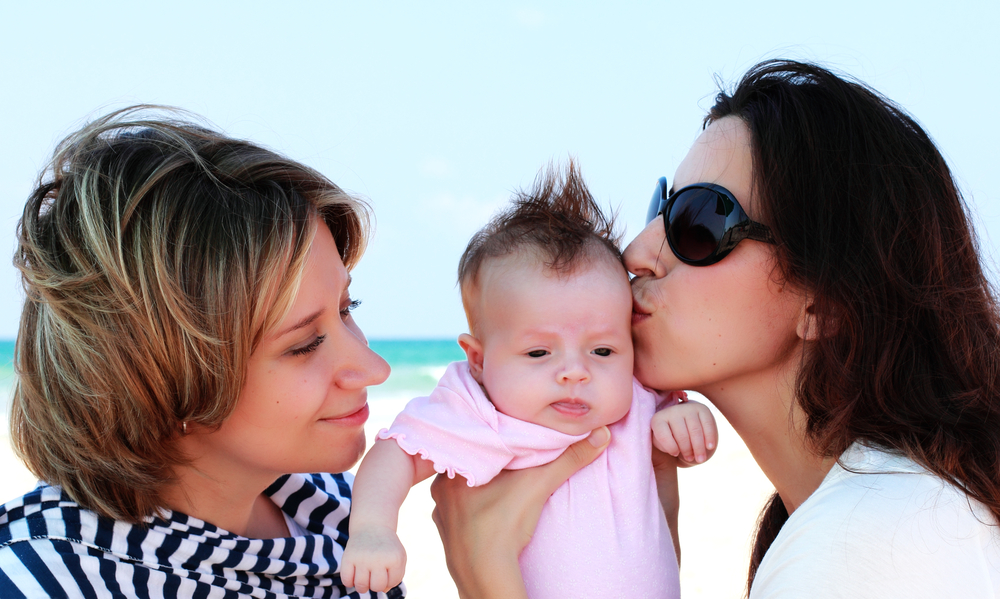
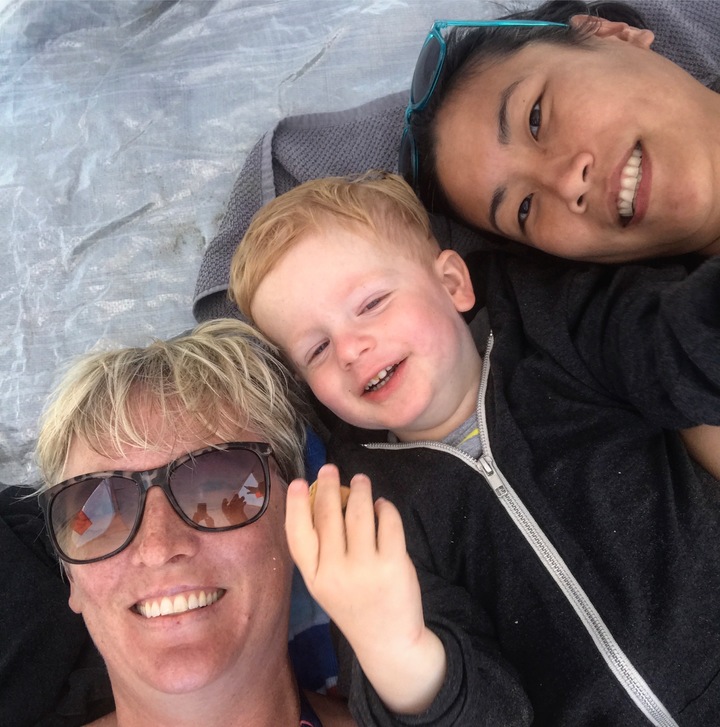
Pride and Family
Gay Parent Magazine
Happy Father's Day
Pete and Chasten: Being a Dad
Tig Notaro: Her Sons Didn't Know She Was Gay
Our Favorite LGBTQ Moms
Jared Polis: Being a Dad, Husband, and
America's first Out Gay Governor
Celebrate Father’s Day With These Famous Gay Dads
What is it Like to be a Queer Parent in 2024?
Pete Buttigieg Discusses Life with
Husband Chasten and Twins
This Is What Gay Fatherhood Looks Like
Though this media "mainstreamification" of gay parenting
is a relatively new phenomenon, for decades, gay parents
have had children in all sorts of family configurations,
including through adoption, previous heterosexual
relationships, or, increasingly, by choosing to have
biological offspring using in vitro, surrogate, and
other methods. According to the 2010 census, a quarter
of same-sex American households are raising children,
gaining ground on heterosexual couples, who parent at a
rate of just under 50 percent.
So, millions of children in the United States today have
LGBTQ parents. And,
just as these families have appeared front and center in
the opening credits of the American sitcom, so too have
they shouldered themselves front and center in the group
photo of the real life American family. Turns out
"alternative families" aren't so alternative anymore.
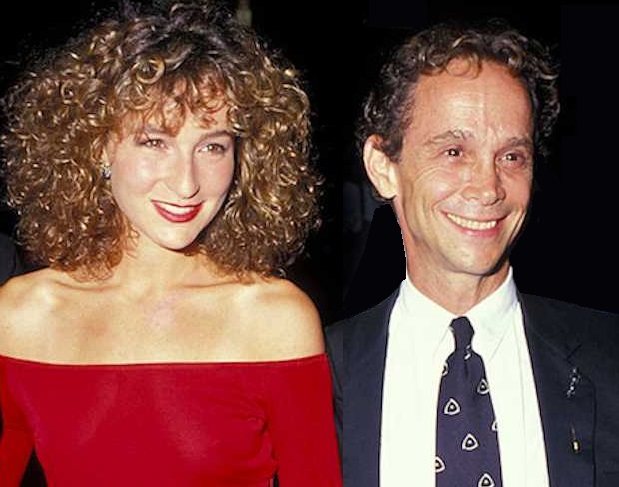
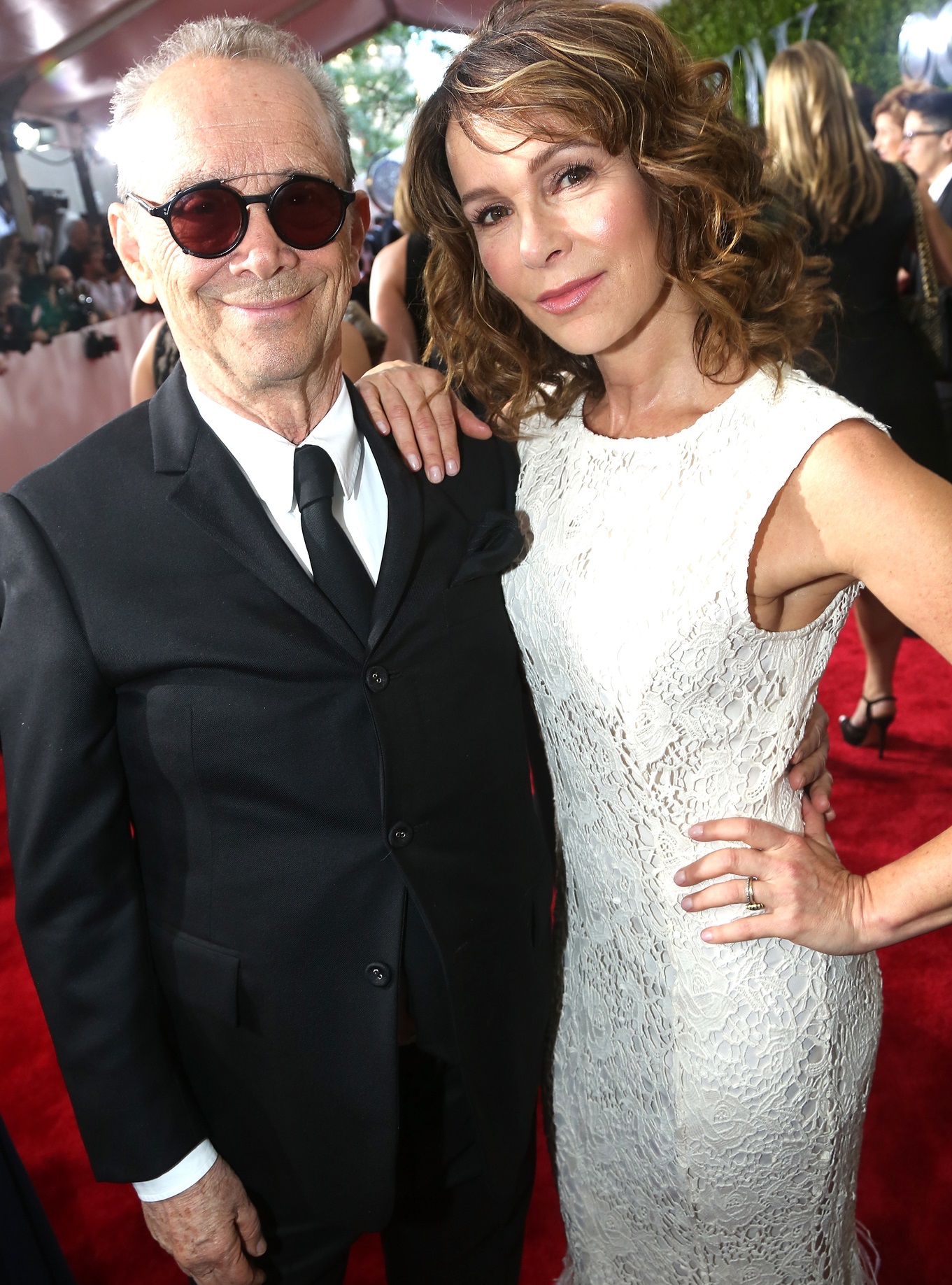
Cheyenne Jackson's Kids Came Out as
Straight
Cynthia Nixon: My Kids are Thriving, My Wife is
Beautiful, I am Happy
Celebrate Father’s Day With These Famous Gay Dads
Gays With Kids: Mitch and Jake’s Adoption Journey
Conservatives Outraged: Gay Couple on Cover of Parents
Magazine
Info: LGBTQ Adoption
Lesbian Moms Raising Children
Photos of What Gay Fatherhood Looks Like
Stories of Gay Dads and
Their Foster Families
Surrogacy to Start a Family: Tips for Gay Men
LGBTQ Parenting
Research: LGBTQ Parents and Healthy Family Dynamics
Gay Parent Magazine
Jennifer Grey Recalls When She Learned Dad Joel Grey was
Gay: Sniper Attack
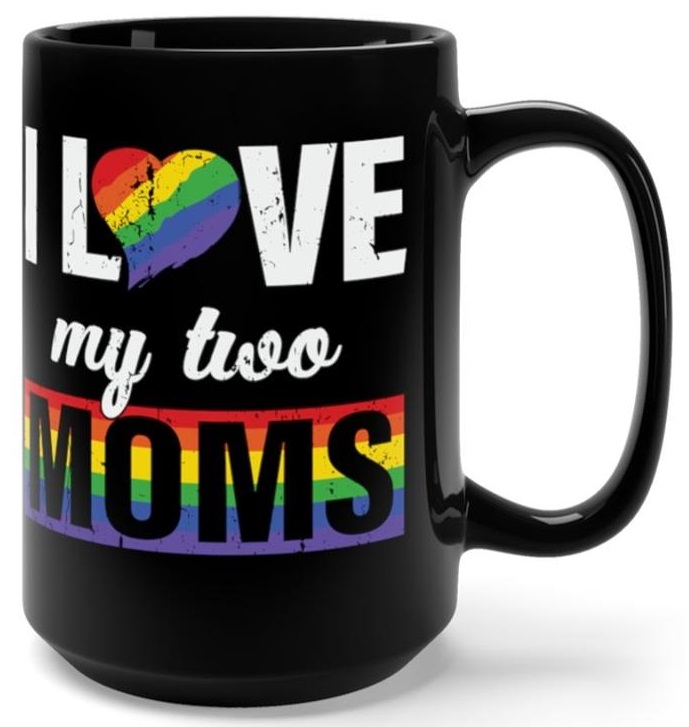
Same Sex Parents and Their Children
Studies estimate that between 1 and 9 million children
in the United States have at least one parent who is
lesbian or gay. There are approximately 594,000 same-sex
partner households, according to the 2000 Census, and
there are children living in approximately 27 percent of
those households.
It is difficult to obtain an accurate count of same-sex
parent families because many lesbians and gay men are
not open about their sexual orientation due to fears of
discrimination, such as loss of employment, loss of
child custody, and antigay violence. There is not a
“usual” gay family. Some same-sex couples may decide to
have a child within their relationship, while others may
bring children from previous heterosexual or same-sex
unions. The rise in same-sex parenting is partially due
to the increase in options available for same-sex
couples to become parents. Although most children of
same-sex couples are biological children of one of the
parents, a growing number are the result of donor
insemination, surrogacy, foster care and adoption.
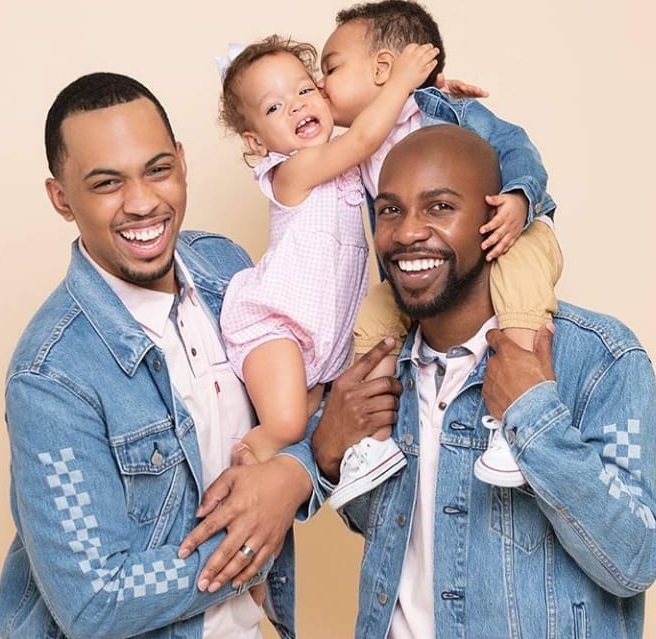
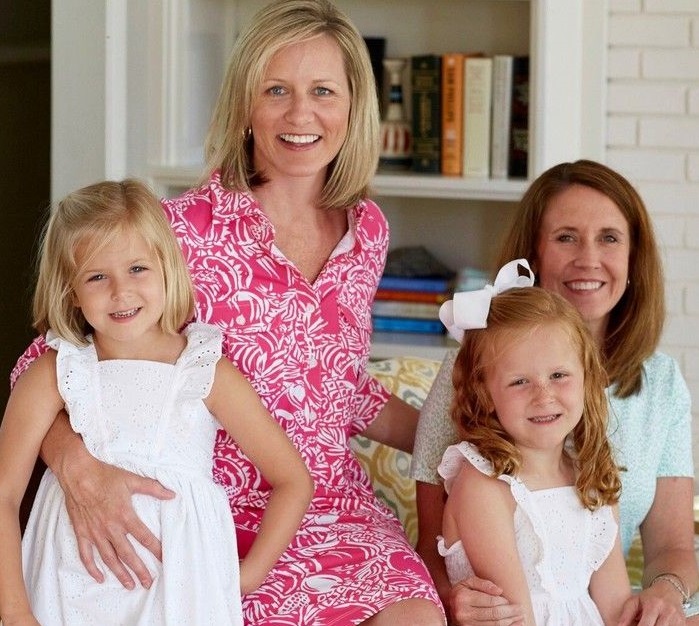
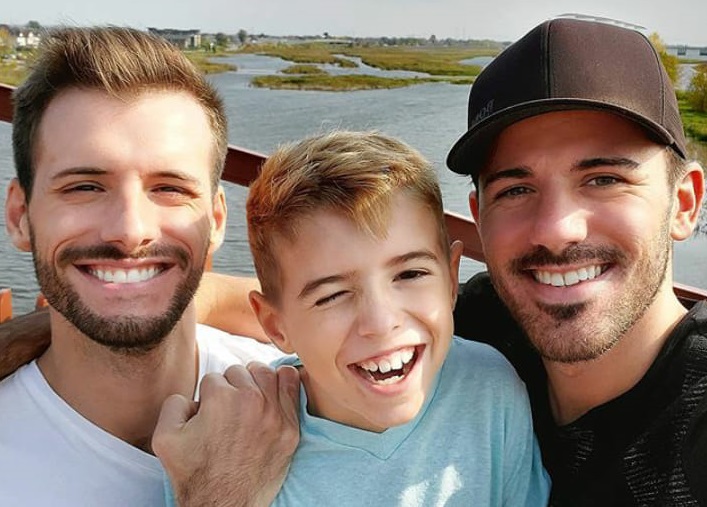
Pride and Family
Tig Notaro: Her Sons Didn't Know
She Was Gay
What is it Like to be a Queer Parent in 2024?
Celebrate Father’s Day With These Famous Gay Dads
Pete Buttigieg Discusses Life with
Husband Chasten and Twins
Famous Queer Dads Living Their Dream
Two Moms in
Motion
New Report: Gay Dads Make Better Parents
Jared Polis: Being a Dad, Husband, and
America's first Out Gay Governor
Gay Dads Through Surrogacy: Enrique and
Mason
Tips for Parenting as a Queer Couple From
Someone Who’s Been There
Singer Brandi Carlile:
Raising Children as an LGBTQ Mom
How Gay Dads Respond to "The Mommy"
Question
This Is What Gay Fatherhood Looks Like
Our Favorite LGBTQ Moms
Most research studies show that children with two moms
or two dads fare just as well as children with
heterosexual parents. In fact, one comprehensive study
of children raised by lesbian mothers or gay fathers
concluded that children raised by same-sex parents did
not differ from other children in terms of emotional
functioning, sexual orientation, stigmatization, gender
role behavior, behavioral adjustment, gender identity,
learning and grade point averages. Where research
differences have been found, they have sometimes favored
same-sex parents.
For example, adolescents with same-sex parents reported
feeling more connected at school. Another study reported
that children in gay and lesbian households are more
likely to talk about emotionally difficult topics, and
they are often more resilient, compassionate and
tolerant. The same concerns that face many heterosexual
parents when they are deciding to have children also
face same-sex parents including time, money, and
responsibilities of parenthood. Likewise, many of the
parenting tasks faced by same-sex parents are similar to
those faced by heterosexual parents, such as providing
appropriate structure for children, while also being
warm and accepting, setting limits, teaching open and
honest communication, healthy conflict resolution, and
monitoring of child’s peer network and extracurricular
activities. Some differences may include adapting to
different types of family forms, the impact of social
stigma on the family, and dealing with extended family
members who may not be supportive of same-sex parenting.
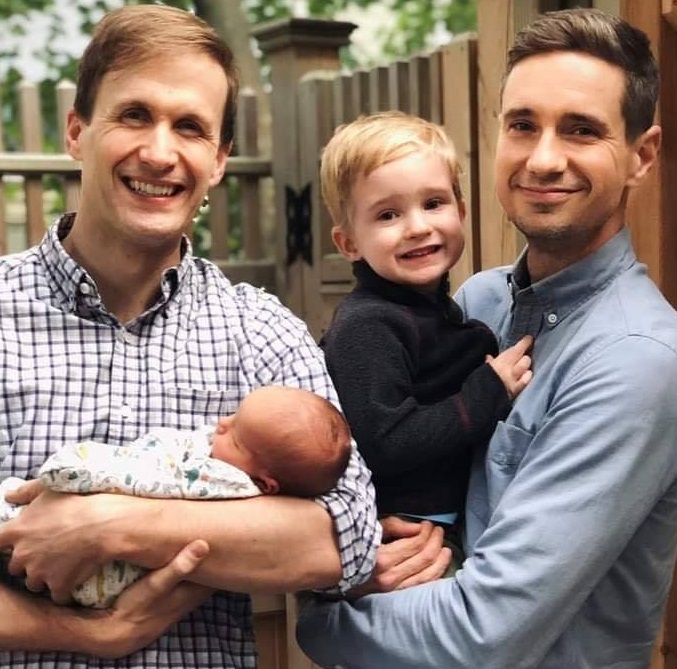
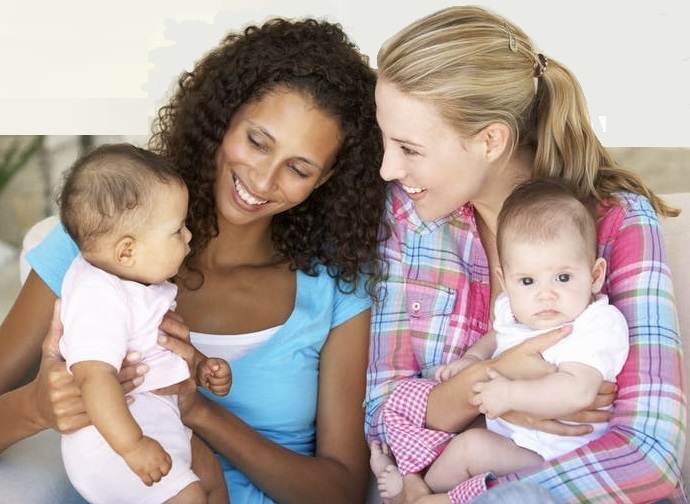
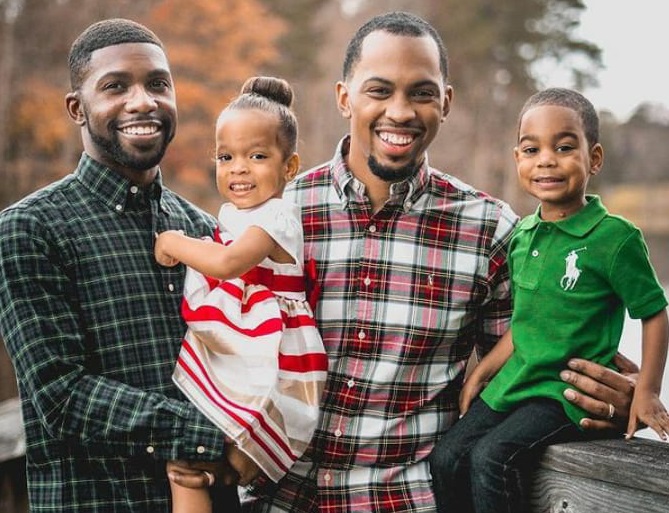
Pete and Chasten: Being a Dad
My Gay Mums Are My Best Friends
Queer Mom Chronicles
Cheyenne
Jackson's Kids Came Out as
Straight
Joys and Challenges of Queer Motherhood
Daddy, Poppa, Grace, and Charlotte
Back-to-School for LGBTQ Parents
Famous Queer Dads Living Their Dream
Pete and Chasten Buttigieg to Become
Parents After Adoption Struggle
Video: Two Dads, Two Kids, Normal Family
Stories of Gay Dads and
Their Foster Families
Celebrities Raised by Gay Parents
Brief History of LGBTQ
Parenting
Two Moms in
Motion
One of the biggest
challenges facing same-sex parented families is that
they must live in a culture that supports heterosexist
and homophobic attitudes and beliefs, which can affect
these families in a variety of ways. A second
complication is that these families are usually part of
a blended family and include children from previous
heterosexual marriages. Some of these families may deal
with disagreement from other family members about the
authenticity and validity of their family patterns. Lack
of support from a previous heterosexual partner or the
other biological parent can cause major conflict and
distress within the family system. Today, there are many
therapists available who specialize in gay and lesbian
issues and provide a safe, nonjudgmental and
understanding environment for the family. Frequently,
gay and lesbian parented families will seek therapeutic
help for guidance, support, and recognition that they
may not be receiving from the broader social arena.
Major issues affecting same-sex parented families that
are often addressed in therapy:
--Lesbian and gay parented families may have concerns
about discrimination in parenting and custody
arrangements. A parent’s minority sexual orientation
and/or gender identity status may be brought up in
custody disputes as a reason to restrict or deny custody
by the children’s other parent and/or by the courts.
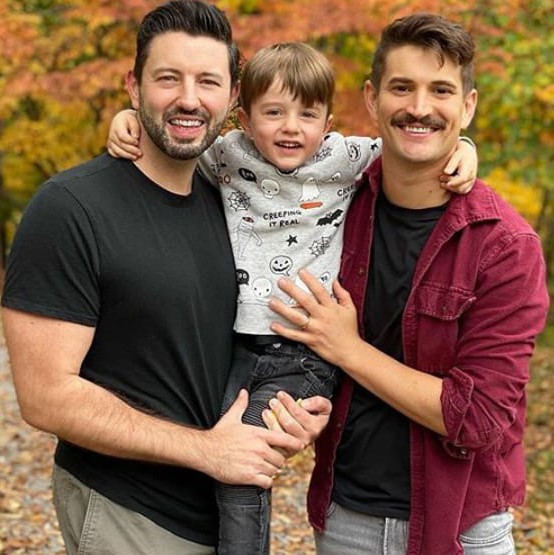
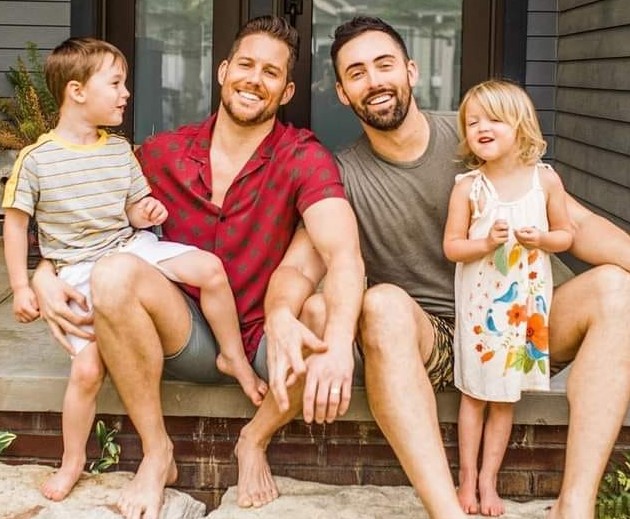
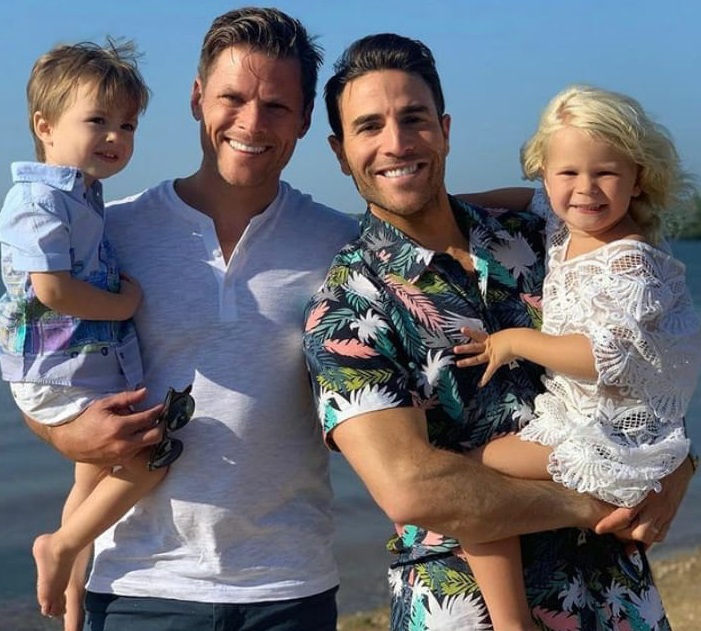
Cynthia Nixon is Leaning into
Queer Joy, Art, and Family
Between Protests
What is it Like to be a Queer Parent in 2024?
Pete Buttigieg Discusses Life with
Husband Chasten and Twins
Gay Parent Magazine
Our Favorite LGBTQ Moms
This Is What Gay Fatherhood Looks Like
Jared Polis: Being a Dad, Husband, and
America's first Out Gay Governor
Things People Ask Gay Dads
The Ham Family
Famous Queer Dads Living Their Dream
No Differences Between Children of Same-Sex and
Opposite-Sex Parents
Photos of What Gay Fatherhood Looks Like
Children of Gay Parents Speak for Themselves
--The many
co-parenting and blended family complexities present for
heterosexual parents can also be present for same-sex
parents with the additional complexities of
discrimination, stereotypes, and assumptions.
--Relationships and
problems with non-biological parent figures are common
among lesbian and gay parented families simply due to
the biological complexities involved with conceiving
children when parents are the same sex.
--In same-sex
relationships, it is common for extended family to
acknowledge intimate relationships differently from
heterosexual relationships; this discriminatory
treatment can be confounded by parenting relationships
as well. Extended family may see parenting as a
necessary step in validating a relationship for same-sex
couples or they may view parenting with similar biased
and discriminatory views, even denying one parent’s
relationship to the children.
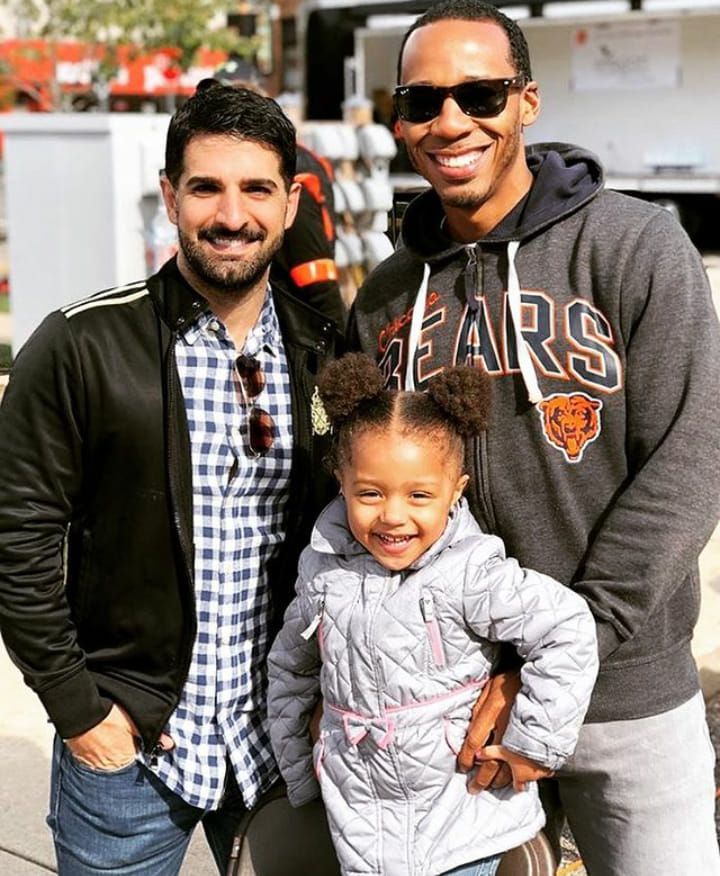
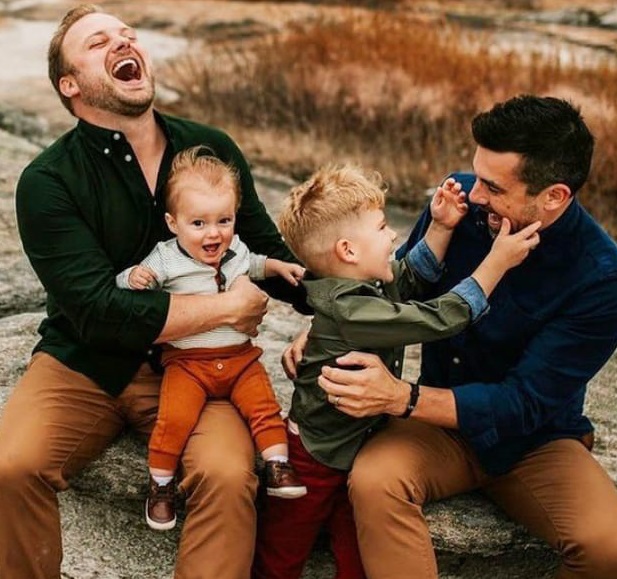
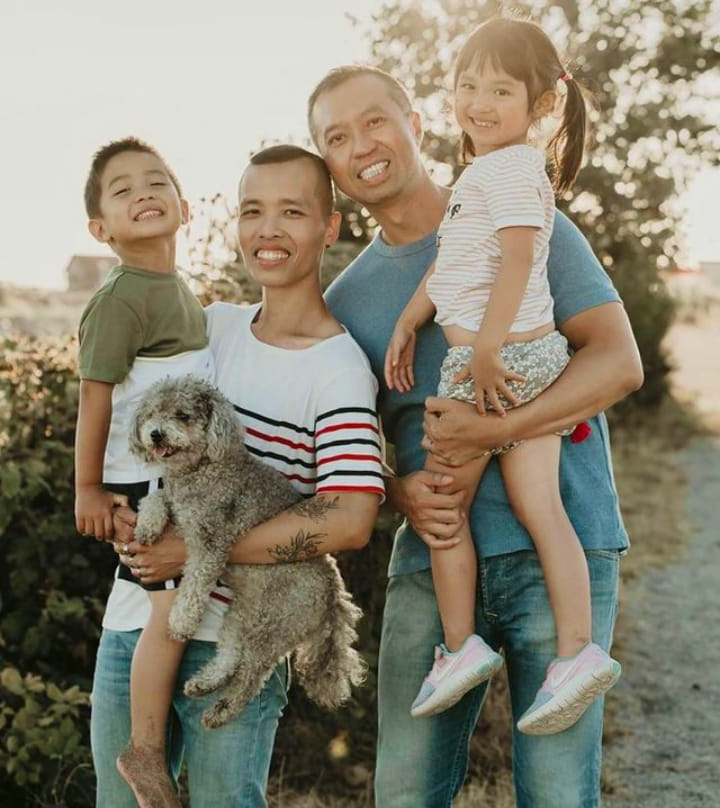
Pride and Family
Gay Dads Share Personal Stories
Tig Notaro: Her Sons Didn't Know
She Was Gay
Celebrate Father’s Day With These Famous Gay Dads
Info: LGBTQ Families
Pete and Chasten: Being a Dad
New Book:
Ultimate Guide for Gay Dads
Advocate: What I've Learned From Being a Gay Dad
In My Shoes: Stories of Youth with LGBTQ
Parents
PBS Video: Olivia Has Two Moms
Straight Daughter Responds to Questions About Her
Lesbian Moms
Celebrities Raised by Gay Parents
Two Moms in Motion
Famous Queer Dads Living Their Dream
--Explaining
relationship status and family make-up to school
professionals, medical professionals, children’s
friends/parents, as well as explaining relationship
status and family make-up to children, can be uniquely
complex for same-sex parents. Though many family
relationships may be complex, explaining family
relationships is uniquely complex for lesbian and gay
parented families because of the lack of societal norms
and relevant examples in media, stereotyped notions
about such relationships that are common, and the fear
of discrimination faced by these families.
--Competent parenting
may be influenced by gay and lesbian parents’ ability to
accept and acknowledge their identity and how they are
able to negotiate living in a heterosexist, homophobic,
or otherwise discriminatory society, while rearing their
children in a family unit that is not socially
sanctioned. Therapists acknowledge the prevalence both
of homophobia that is experienced by the family as a
result of the actions of others, as well as the
existence of internalized homophobia and how this may
impact families. Internalized homophobia is defined as a
set of negative attitudes and affects toward
homosexuality in other persons and toward homosexual
features in oneself. Therapists will help illustrate to
the family how homophobia could be impacting them. Both
internalized homophobia and experiences of outside
discrimination may mean that families need more time in
therapy to build rapport with the therapist and to feel
comfortable disclosing personal and family-related
concerns.
[Source: AAMFT,
Deanna Linville PhD, Maya O’Neil MS]
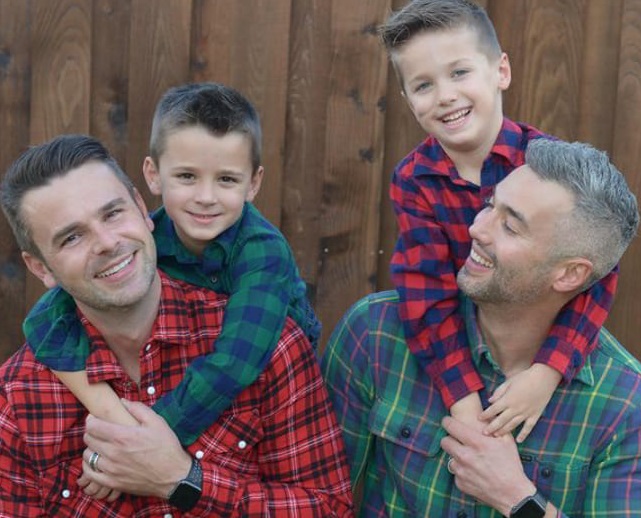
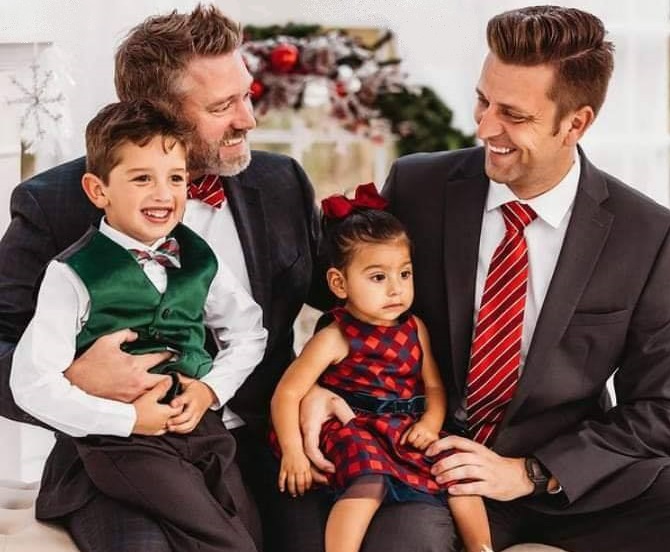

Cheyenne
Jackson's Kids Came Out as
Straight
What is it Like to be a Queer Parent in 2024?
Pete Buttigieg Discusses Life with
Husband Chasten and Twins
Our Favorite LGBTQ Moms
My Gay Mums Are My Best Friends
Advocates for Youth
Brief History of LGBTQ
Parenting
Queer Mom Chronicles
Joys and Challenges of Queer Motherhood
Famous Queer Dads Living Their Dream
Singer Brandi Carlile:
Raising Children as an LGBTQ Mom
Gay Parents: Gabriel and Dylan's Story
Tips for Parenting as a Queer Couple From
Someone Who’s Been There
World's Largest Study of
LGBTQ Parents
Steve and Rob: Two Dads Adopt Six Siblings
What I've Learned From Being a Gay Dad
Love is love
The desire to parent is universal, just ask the
penguins. A couple of male penguins in the Berlin Zoo,
Ping and Skip, have come together to have a child. In
the process of adopting an egg, Ping and Skip have
evolved. Where they were more outgoing and easier to
approach, they have taken the job of trying to hatch an
egg, as any parent would, quite seriously. This is a
wonderful story, not just because it makes us feel good,
but because it reinforces the universal desire to have
children regardless of sex, gender identity, or even
species.
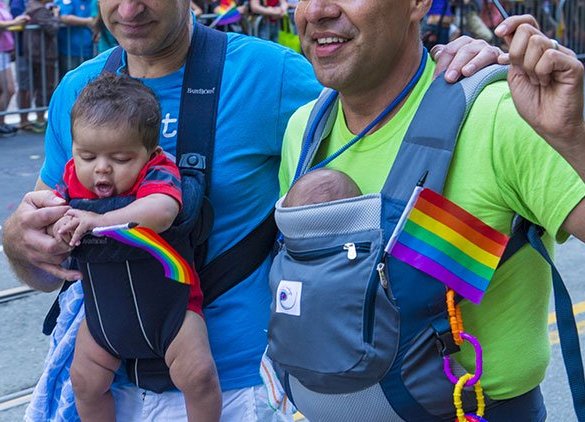

Similar to most gay men I struggled with the coming out
process. I strongly desired to be a parent. And as a
fertility doctor I knew this was possible. What was
enlightening was after we had our first child is that in
the eyes of my community, I went from being a gay man or
gay professional to being a parent just like most of my
straight friends. And remarkably, with this transition
nobody seemed to really care who I slept with.
I share this personal aspect of my life to offer
perspective to LGBTQ people who want to be parents. Once
you have a family you will have this common bond with
the vast majority of our population and something they
can relate to — having children. You are no longer
someone living this “special” lifestyle, you are a
parent on a shared journey. And there is so much more to
talk about: diapers, bottles, runny noses, strollers.
For whatever reason in our Judeo-Christian Western
society, somebody’s sexuality has become in many ways
more significant than the good work they do or the job
they have. However, parenting is the one and only job
that has no prerequisites, is held by the majority of
the population, requires no training or oversight, and
is very relatable to everyone who holds it. It is also
the only job you can’t be fired from.
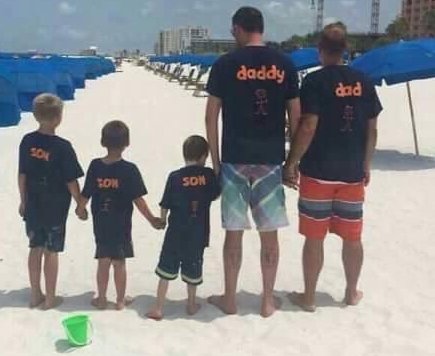
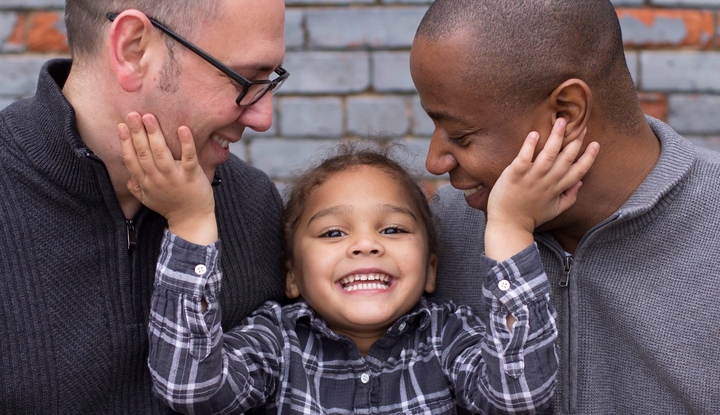
Advocate: What I've Learned From Being a Gay Dad
LGBTQ Nation: Foster Kid Dreams of Being Adopted by Two
Days
Steve and Rob: Two Dads Adopt Six Siblings
Gay Dads Share Personal Stories
New Book: Ultimate Guide for Gay Dads
Ron and Greg: Story of Two Gay Dads
New Report: Gay Dads Make Better Parents
Gay Parents: Anthony and Bryon's Story
Children Raised by Same Sex Parents at No Disadvantage
Gay Parents: Gabriel and Dylan's Story
Because all that is necessary to be a parent is to
provide unconditional love. Whether you are straight,
gay or any other identity under our rainbow, you have
the ability to have children and do not need to stress
over whether or not your family will be different. All
you have to do is love your children unconditionally.
My parenting journey brought me very much out of the
closet — I had to be proud of my family because I want
them to be proud of our family. It wasn’t about me
anymore. The reality is that 5-7% of patients identify
as LGBTQ, and there may be a greater likelihood that
your child might be LGBTQ because you are. Therefore,
you need to be proud of who you are and who your family
is, establish and maintain this foundation
unconditionally.
As a parent who lives in suburbia, I’ve learned that
there are plenty of straight couples that have their own
parenting struggles--be that simply getting along with a
spouse, or the everyday tribulations of raising children
and the havoc that wreaks on any relationship.
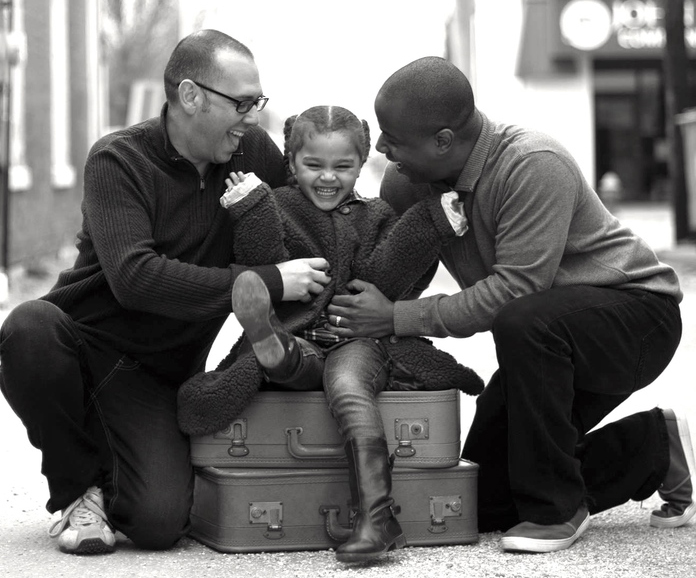
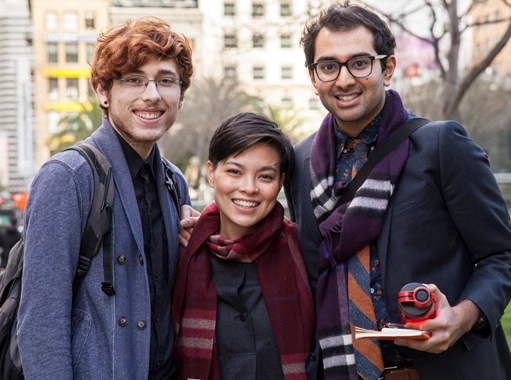
From 20 years of being an infertility doctor, I know
that 1 out of 6 couples struggle to become parents. So
while the struggle for parenthood among the gay
population is different, it is not unique. The desire to
be a parent is common for most humans, and while
everyone struggles, I support everyone who wants to be a
parent and will work tirelessly to get them there.
The message I impart to my LGBTQ friends and all
patients is simply this: anyone can be a parent if they
wish to, and while the journey may be a nuanced for
someone in the LGBTQ community, the end result is the
same. Love is love, and if it is what you want, take the
plunge to parenthood.
[Source:
Dr. Mark Leondires | Medical Director | Advocate
Magazine | Oct 2019]
Advocate: What I've Learned From Being a Gay Dad
LGBTQ Nation: Foster Kid Dreams of Being Adopted by Two
Days
Steve and Rob: Two Dads Adopt Six Siblings
Gay Dads Share Personal Stories
New Book: Ultimate Guide for Gay Dads
Ron and Greg: Story of Two Gay Dads
New Report: Gay Dads Make Better Parents
Gay Parents: Anthony and Bryon's Story
Children Raised by Same Sex Parents at No Disadvantage
Gay Parents: Gabriel and Dylan's Story
Talking With
Grown Kids of
Gay Parents
Here are some tips for
dealing with having gay
parents...
Dealing With Harassment...
There's nothing for you to be
embarrassed about and there's no
reason for you to apologize.
This can be hard to keep in mind
when others are telling you that
your parents are weird. Just
remember that you probably
aren't embarrassed that you have
two fathers or two mothers.
You're probably more embarrassed
by what your friends or the
other kids at school will say or
think about it.
Don't worry about what others
think. What is important is that
you are true to yourself and
considerate of others, but that
doesn't mean you need to cater
to the sensibilities of others.
Instead of apologizing for your
parents, try saying, "I'm sorry
you feel that way" or simply "I
love my parents the way they
are."
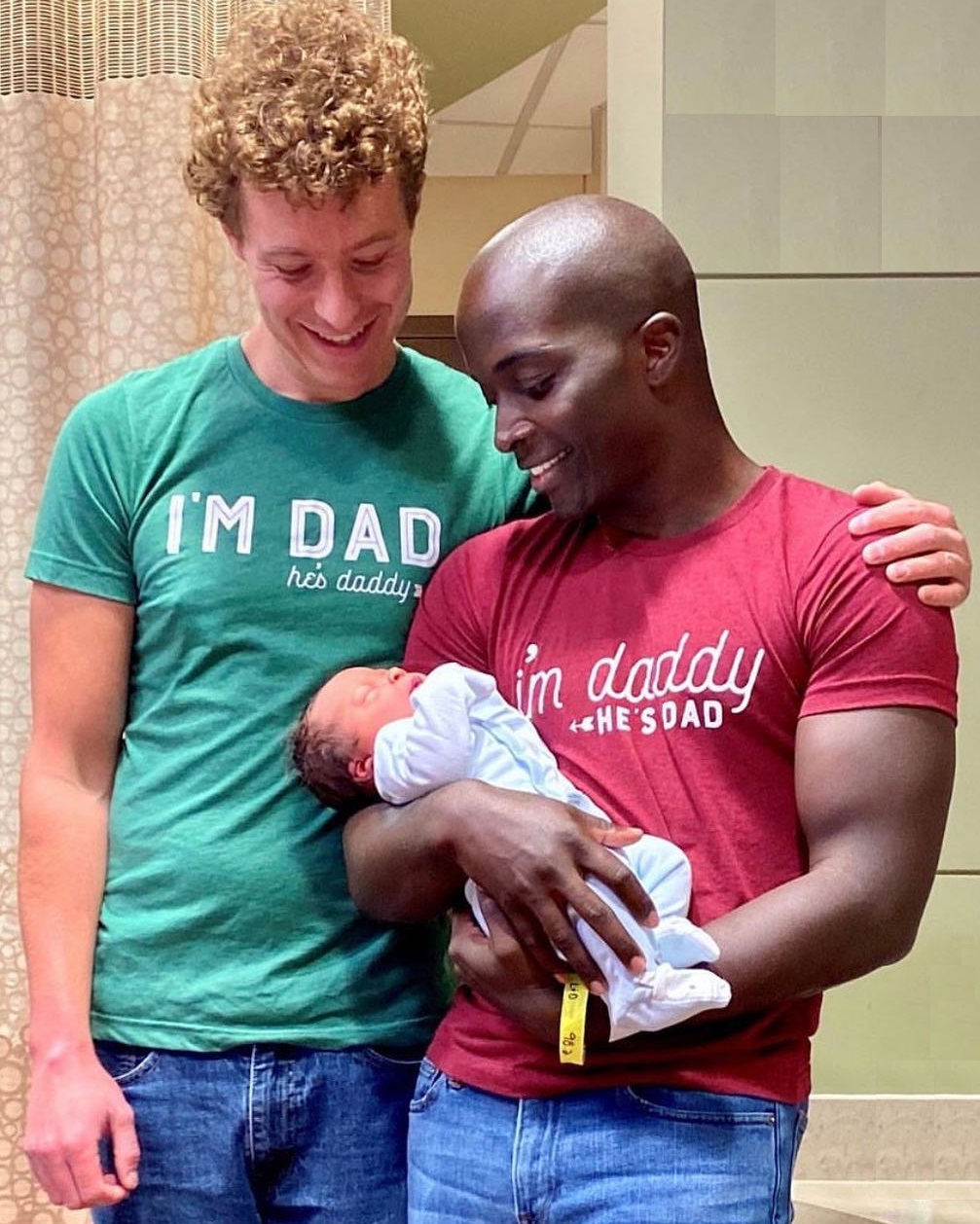
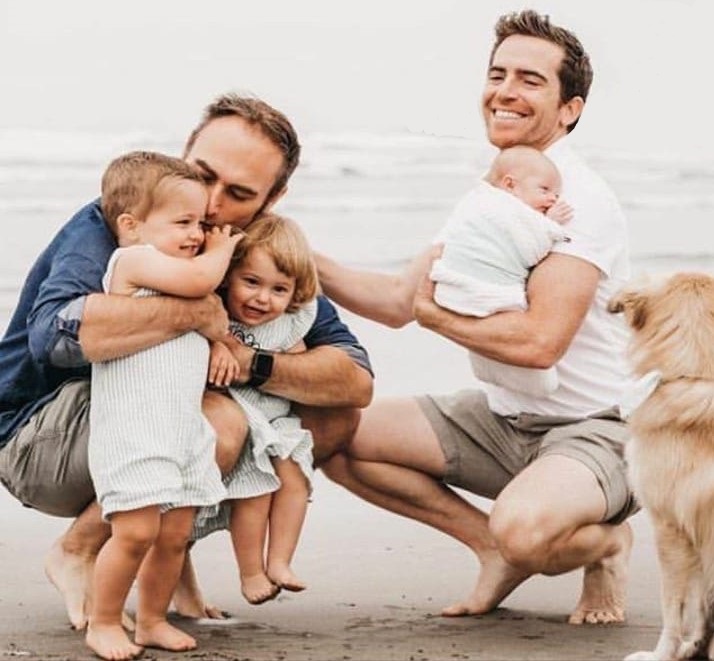
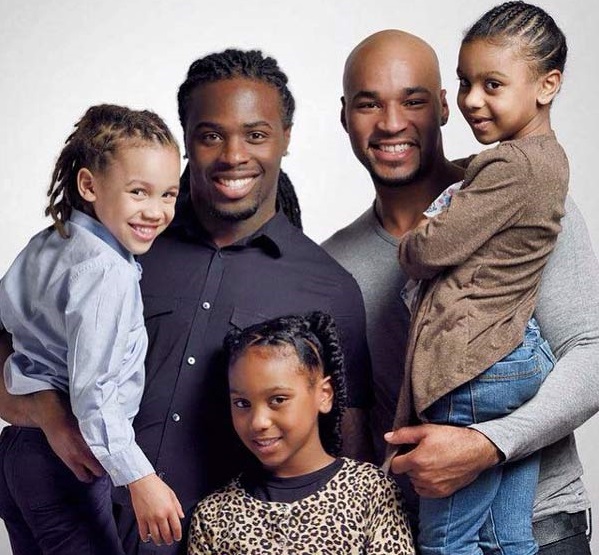
Pride and Family
Gay Parent Magazine
Happy Father's Day
Cynthia Nixon: My Kids are Thriving, My Wife is
Beautiful, I am Happy
Our Favorite LGBTQ Moms
Pete and Chasten: Being a Dad
Jared Polis: Being a Dad, Husband, and
America's first Out Gay Governor
Celebrate Father’s Day With These Famous Gay Dads
What is it Like to be a Queer Parent in 2024?
Pete Buttigieg Discusses Life with
Husband Chasten and Twins
This Is What Gay Fatherhood Looks Like
Remember that there is
nothing wrong with being gay...
Your parents are good, loving
people who care deeply about
each other and you. Their
relationship is just as valid
and important as the
relationships straight people
have. In addition, the fact that
they are gay has no bearing on
the way they treat other people,
and certainly does not affect
the way they treat and deal with
you.
Anyone who teases you about your
parents' relationship is
probably someone who has had no
interaction with gay people, to
their knowledge.
Walk away from ignorant
comments and people...
Many times people say mean
things because they are lacking
something in their own lives.
Knowing this, however, doesn't
make putting up with harassment
any easier. If someone is making
fun of your family it is best to
just walk away. However, you get
to walk away knowing that what
they are saying is saying
something really sad about them,
not you.
Tell someone harassing you, "I'm
not interested in listening to
ignorant comments about my
family." You could even simply
state, "I don't want to talk
about this with you."
You have just as much right to
exist as the kids who give you a
hard time. You don't have to be
like them or get along with them
to be cool.
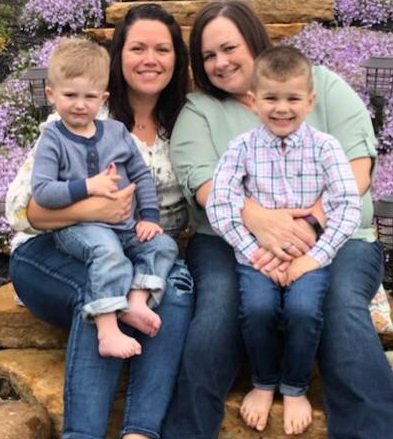

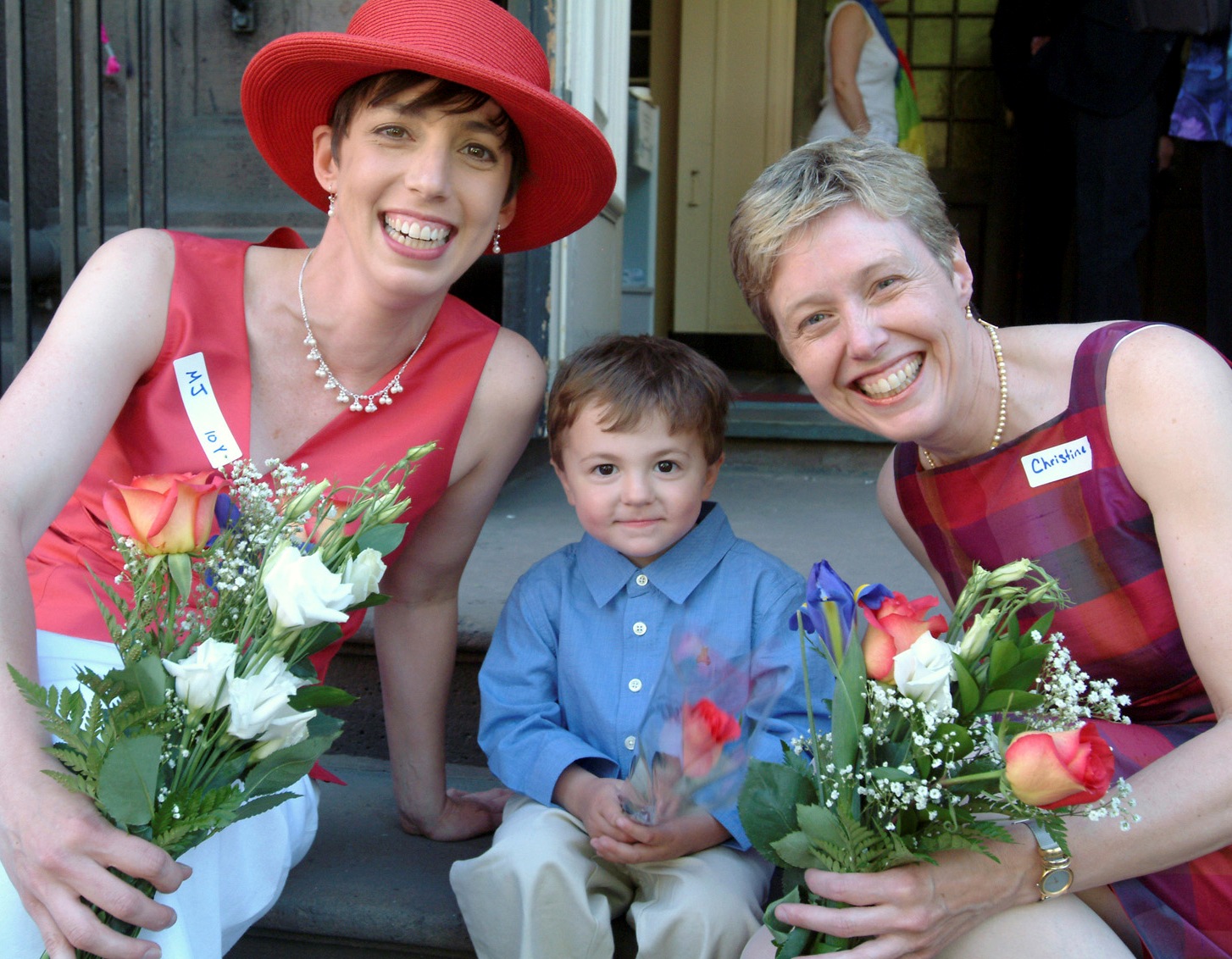
Celebrate Father’s Day With These Famous Gay Dads
Cheyenne Jackson's Kids Came Out as
Straight
Gays With Kids: Mitch and Jake’s Adoption Journey
Conservatives Outraged: Gay Couple on Cover of Parents
Magazine
Info: LGBTQ Adoption
Lesbian Moms Raising Children
Photos of What Gay Fatherhood Looks Like
Stories of Gay Dads and
Their Foster Families
Surrogacy to Start a Family: Tips for Gay Men
LGBTQ Parenting
Research: LGBTQ Parents and Healthy Family Dynamics
Try to change an ignorant
person's mind...
You shouldn't feel like you have
to do this but it may be worth
your time. Someone who is
homophobic because they haven't
been around a lot of gay people
may just need some positive
exposure to change their mind.
Instead of avoiding that person,
you could:
Invite the problem person to
your home. Ask them over just to
hang out with a group of other
friends. Try saying, "I know you
say you don't like gay people
but my parents are great and I
would love for you to meet
them." If you can put one or
both of your parents in the same
room with this person, and just
let them see that your parents
are kind, fun people who don't
deserve to be hated simply
because they are misunderstood,
it will help the situation a
lot.
Try talking to them. Ask the
person bothering you "Why are
you giving me a hard time?"
Depending on how they answer
that question, you can gauge
whether you want to take the
time to change their mind.



Celebrate Father’s Day With These Famous Gay Dads
Pete Buttigieg Discusses Life with
Husband Chasten and Twins
Cynthia Nixon is Leaning into
Queer Joy, Art, and Family
Between Protests
Famous Queer Dads Living Their Dream
Two Moms in
Motion
New Report: Gay Dads Make Better Parents
Jared Polis: Being a Dad, Husband, and
America's first Out Gay Governor
Gay Dads Through Surrogacy: Enrique and
Mason
Tips for Parenting as a Queer Couple From
Someone Who’s Been There
Singer Brandi Carlile:
Raising Children as an LGBTQ Mom
How Gay Dads Respond to "The Mommy"
Question
This Is What Gay Fatherhood Looks Like
Our Favorite LGBTQ Moms
Surround yourself with true
friends...
It's important to have friends
that you don't have to hide
anything from and who don't care
that you have same-sex parents.
Depending on where you live,
these can be hard to find, but
keep looking and don't give up.
True friends like hanging out
with you because of who you are
and they won't let your parents'
sexual orientation get in the
way of that.
Don't be afraid to talk about
your parents with your friends.
You shouldn't try to hide the
fact that they are gay by not
mentioning them. Instead of
saying "my parents" to hide that
they are gay, say "my dads" or
"my moms" and be proud of the
people that have raised you. In
essence, you should come out to
your friends about having gay
parents.
Hang out with other kids of
same-sex parents...
If you know of any kids in your
school, search them out. If you
don't, you can contact (or ask
your parents to contact) a group
for kids with gay parents. These
are groups that can connect you
with other kids of same-sex
parents, which can help you feel
less alone in your situation.
Do your parents have other gay
friends with kids your age? See
if you can hang out with them
more often.

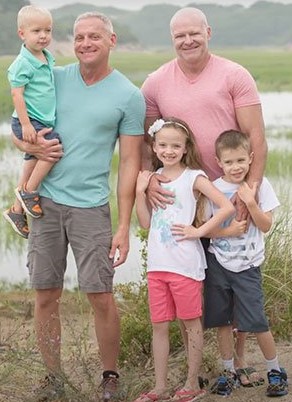
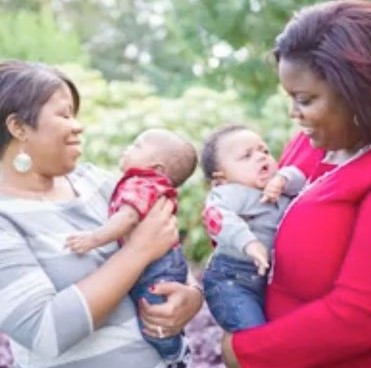
Pride and Family
My Gay Mums Are My Best Friends
Queer Mom Chronicles
Joys and Challenges of Queer Motherhood
Daddy, Poppa, Grace, and Charlotte
Back-to-School for LGBTQ Parents
Famous Queer Dads Living Their Dream
Pete and Chasten Buttigieg to Become
Parents After Adoption Struggle
Video: Two Dads, Two Kids, Normal Family
Stories of Gay Dads and
Their Foster Families
Celebrities Raised by Gay Parents
Brief History of LGBTQ
Parenting
Two Moms in
Motion
Be your own person and
remember who you are...
You are a product of what you
were raised to be. Your parents
love you, and you may sometimes
be embarrassed about their
relationship and how others
perceive your family, but you
love your parents, too. No
matter what others do, remember
this, hold onto your dignity and
integrity and don't worry about
the ignorant or the jerks.
Focus on yourself and the kind
of person you are. Don't allow
yourself to be pressured into
apologizing for who you are.
Focus on doing things with your
family that you enjoy. Doing
activities and following
interests that you all share
will only make your family
stronger and it will also help
you remember who you are as a
person.
Don't deal with ongoing
harassment alone...
You have the right not to be
harassed by others. If you are
having ongoing problems,
consider seeking out help. If
you've tried talking to your
harasser, or tried just ignoring
them, and they won't lay off,
consider talking to a teacher or
counselor about it.

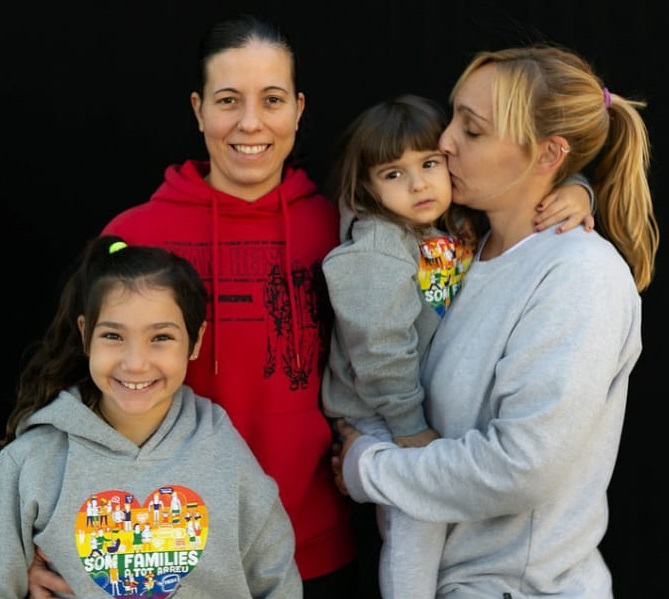
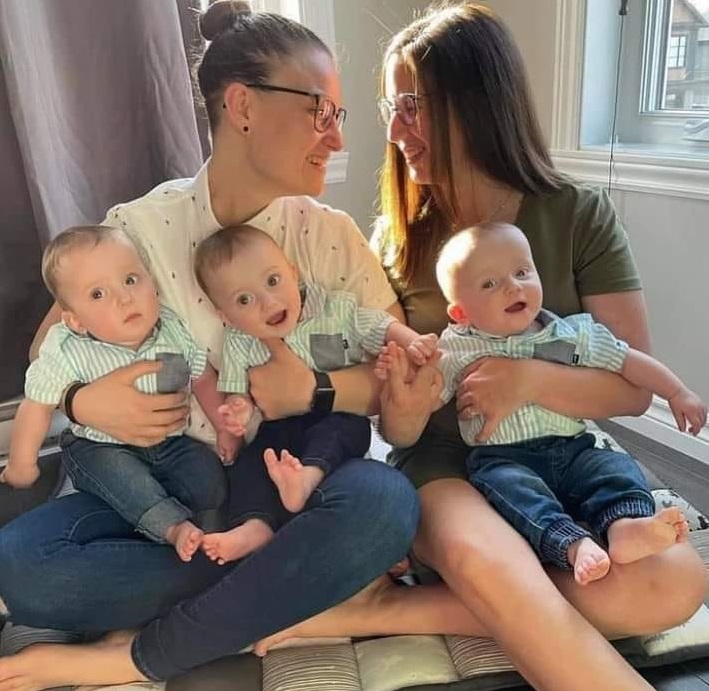
Pete Buttigieg Discusses Life with
Husband Chasten and Twins
Gay Parent Magazine
Our Favorite LGBTQ Moms
This Is What Gay Fatherhood Looks Like
Pete and Chasten: Being a Dad
Cheyenne
Jackson's Kids Came Out as
Straight
Cynthia Nixon: My Kids are
Thriving, My Wife is Beautiful,
I am Happy
Jared Polis: Being a Dad, Husband, and
America's first Out Gay Governor
Things People Ask Gay Dads
The Ham Family
Famous Queer Dads Living Their Dream
No Differences Between Children of Same-Sex and
Opposite-Sex Parents
Photos of What Gay Fatherhood Looks Like
Children of Gay Parents Speak for Themselves
Letting Your Parents Help
You
Tell your parents about your
feelings...
Ask them any questions you have
about their relationship and how
your family was formed. Because
gay families are not always
formed in the same ways as
straight families, it can be
confusing. It can also be very
difficult to be open and honest
with your parents, especially if
what you are going to ask them
relates to sexuality. However,
it is your parents' job to teach
you things and to help you with
problems that you can't figure
out on your own.
Tell them how you are feeling
and ask them to help you if you
are confused. They, better than
anyone else probably, understand
you and the situation.
Try saying, "I love you and I
want to ask you about your
relationship." You could also
just ask one or both of your
parents to tell you how they met
and became a family. This could
create an opening to ask further
questions.
Your parents probably know it's
hard dealing with other kids and
their assumptions about same-sex
parents. In fact, they are
probably trying hard to
understand and make life easier
for you already.
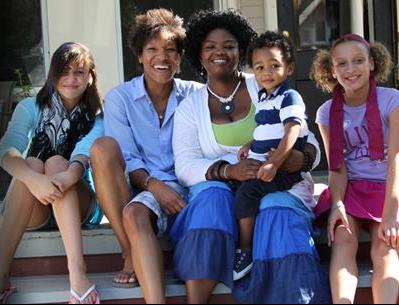
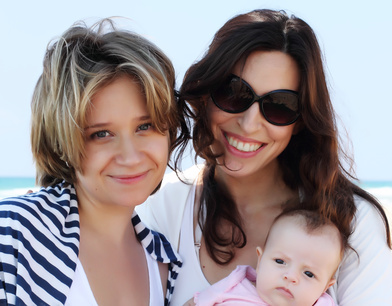
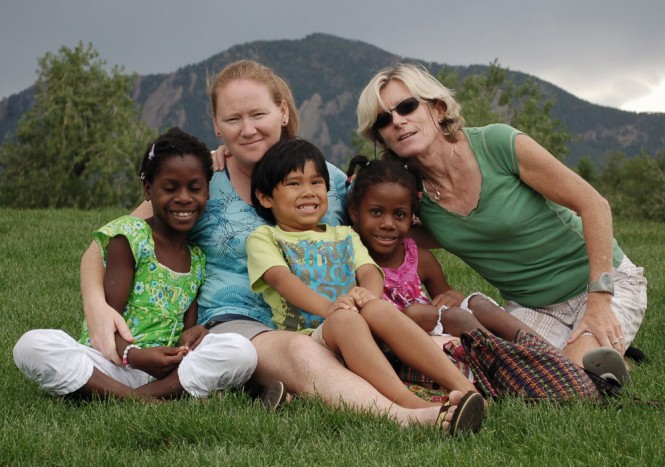
Gay Dads Share Personal Stories
Two Moms in
Motion
Lesbian Couple With Two Kids: Questions for an LGBTQ
Family
Terrell and Jarius: Young Black Gay Couple With Two
Babies
Famous Queer Dads Living Their Dream
Info: LGBTQ Families
Celebrities Raised by Gay Parents
The
Berretts: Questions for an LGBTQ Family
Straight Kid Talks About
Her Gay Parents
How Gay Dads Respond to "The Mommy"
Question
Famous Queer Dads Living Their Dream
Cynthia Nixon is Leaning into
Queer Joy, Art, and Family
Between Protests
Tell your parents if you are
being harassed...
It is important not to suffer in
silence. Talk to them about this
person and what they are saying
to you. It will help them to
understand how your days at
school go and what you are up
against.
If your parents know the whole
situation they will be better
able to offer suggestions about
coping with the harassment.
Remember that your parents
love you...
If you were born after your
parents became a couple, they
probably went through a lot of
medical (artificial
insemination) or legal
(surrogacy or adoption)
procedures just to have you. You
can always take comfort in the
fact that you were dearly
wanted.
Maybe one of your parents is a
biological parent and you were
adopted or just parented by the
other later in life. The parent
that chose to parent you loves
you just as much as the other.
In fact, they actively chose to
make you their kid and to change
their life to be with you, which
should show you how much they
care.
Be grateful for your
parents...
Having two parents who love you
is a lot more than some kids
even have. Studies have
repeatedly shown that the
children of same-sex couples do
just as well in life as the
children of straight couples, so
you have the same potential for
success as others with straight
parents do.
Remember that all parents are
embarrassing sometimes...
In every way but one, most gay
parents are just like straight
parents. They are not lying
awake at night thinking up ways
to embarrass you but sometimes
they just do it. Try not to take
it personally when they say
something embarrassing or uncool.
Just remember that all parents
say and do the wrong thing
sometimes.
[Source: Amber Kent, Quora Blog]
Pride and Family
Talking With
Grown Kids of
Gay Parents
Science Says:
Gay Parents are
Better than
Straight Parents
Cynthia Nixon:
My Kids are
Thriving, My
Wife is
Beautiful, I am
Happy
Famous Queer Dads Living Their Dream
Queer Mom Chronicles
Top Gay Dad Moments of 2021
Dads Celebrate Daughter’s First Birthday After Difficult
Path To Parenthood
Gays With Kids: Gay Surrogacy
Advocate: Study on Lesbian Moms Shows Kids Are Alright
Pete and
Chasten: Being a
Dad
Growing up With Two Moms
My moms have been
together for 28 years but married for only four. In
2015, we were in Orlando, Florida, on a trip as a family
at Walt Disney World Resort. My parents decided that,
while we were in Florida, we needed to go to the
courthouse since gay marriage was legal in Florida. One
morning, we made our way to the courthouse, and they got
married in a small room lined with empty, plastic white
wedding chairs and an arch at the end.
It was only me, my sister and my moms in the room with
the government official. It was a bit of an uneventful
wedding, although some relatives on my birth mom’s side
of the family sent us flowers. Really, it did not need
to be a huge elaborate wedding, because, much like many
other older gay couples, they had already been together
for years by then. They had already established a
household and brought up a family. They just needed a
piece of paper to prove that, in the law’s eyes, we were
all a family. They got that piece of paper on June 16,
2015, hilariously only 11 days before the same-sex
marriage legislation was passed nationwide.
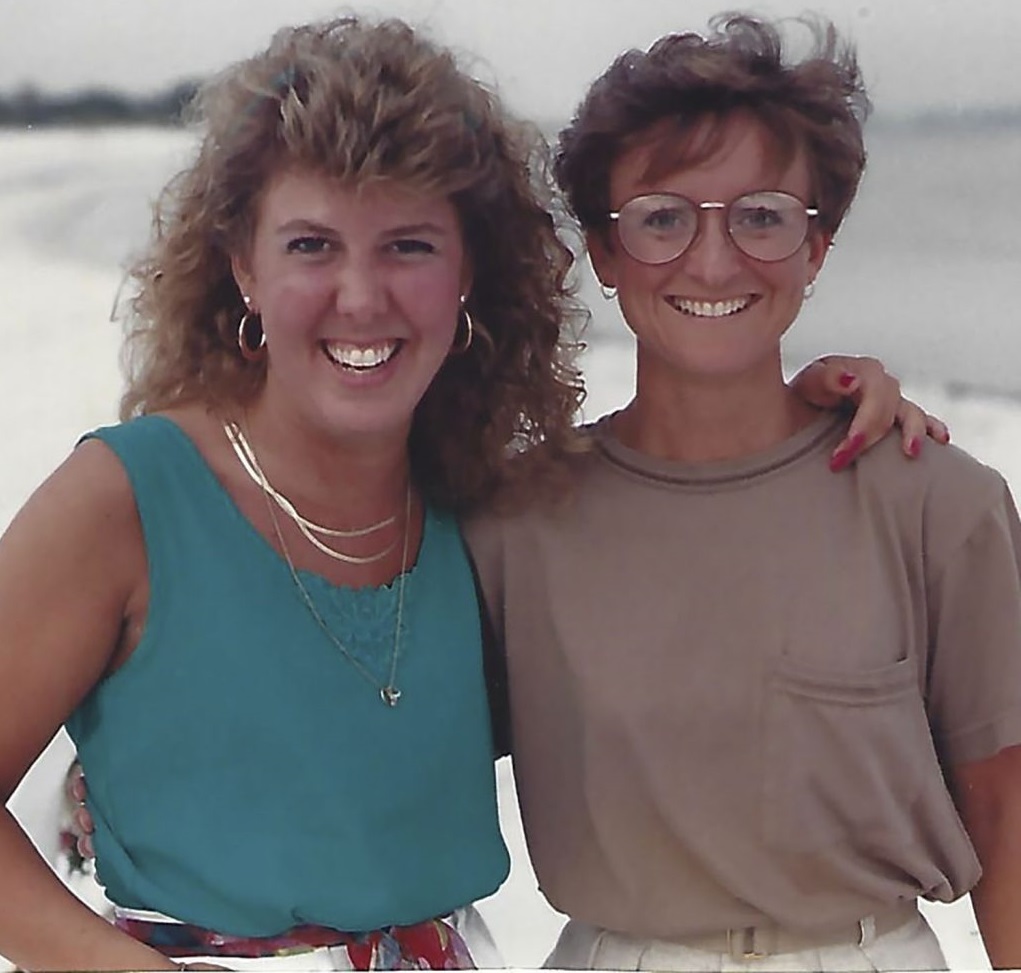
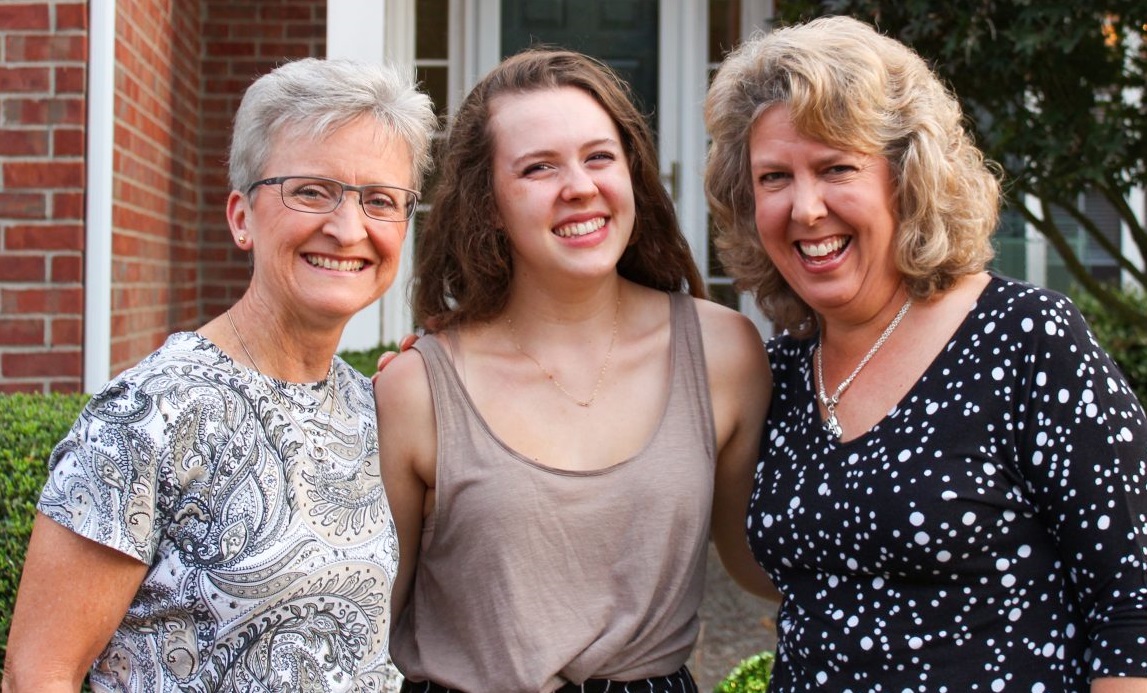
Two Moms in
Motion
My Gay Mums Are My Best Friends
Gay Foster Parents
Kristi and Theresa: Lesbian Parents
Talking With Grown Kids of Gay Parents
Dads Celebrate Daughter’s First Birthday After Difficult
Path To Parenthood
Gays With Kids: Gay Surrogacy
Info: LGBTQ Adoption
Difficult Job: Raising Two
Black Boys as a Lesbian Couple
My
Two Mums: Myths of Gay Adoption
LGBTQ Single Parent
Famous Queer Dads Living Their Dream
As a kid, it’s hard to understand when things so close
to you are different and unorthodox to others. My family
is all I knew. My parents loved me and loved each other.
It seemed normal to me, I did not have society telling
me it was weird and, even more so, that it was something
to hide from people in fear they won’t accept my family.
My family. Me, my little sister, and my two moms.
I still remember when my moms sat my sister Megan and me
down and defined the word “lesbian.” My sister was
probably 3 or 4 and I was maybe 7. Looking back, I
believe they waited as long as possible to define this
word for us. They told us that — that our family was
different. They warned we should not go around proudly
talking about our moms because some people might not
understand and accept our family. It had not occurred to
me that my family was different in a way that could be
perceived as bad to the world.
My moms turned into “my parents,” or “my mom” singular
when I talked about one or both of them. My close
friends who knew I had two moms would ask which one I
was talking about, and I would clarify my birth mom or “Eema,”
which is the Hebrew word for mom. To clarify, we are not
Jewish — my moms just wanted to come up with a way to
distinguish them that would be easy for even a baby to
say.
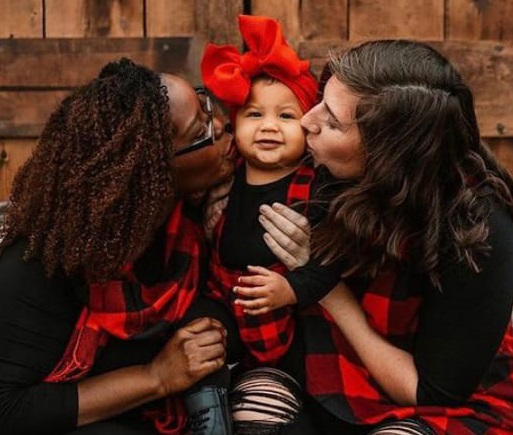
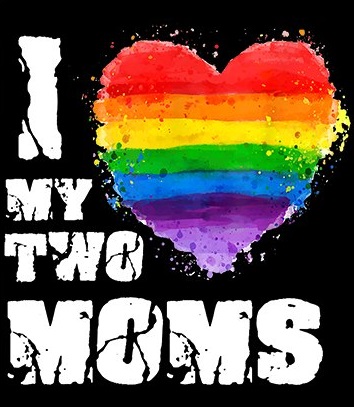
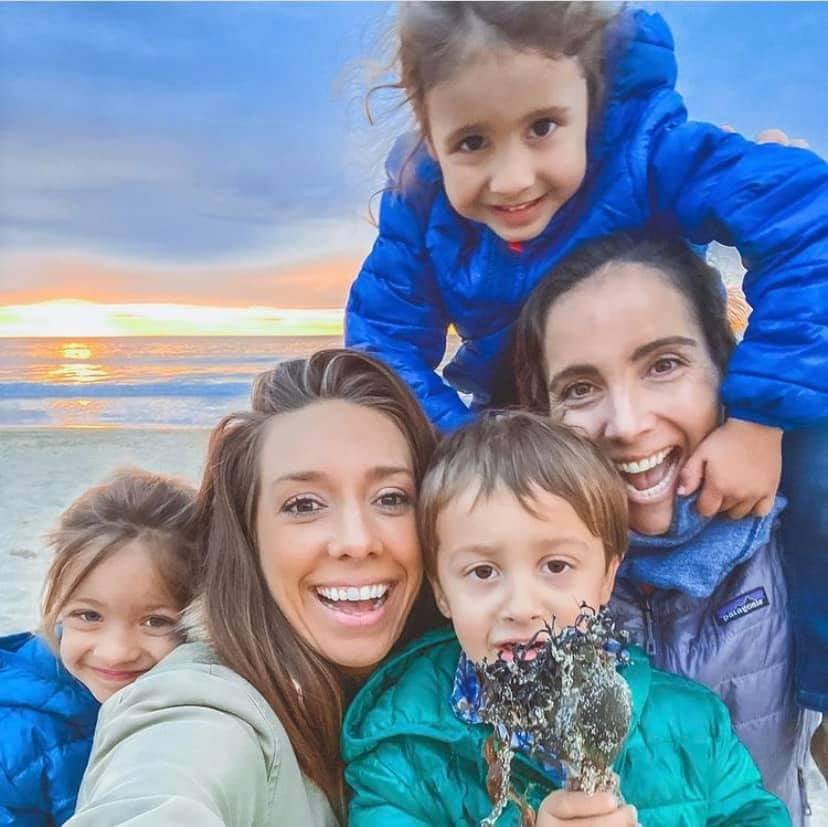
My Gay Mums Are My Best Friends
Famous Queer Dads Living Their Dream
Jared Polis: Being a Dad, Husband, and
America's first Out Gay Governor
Photos of What Gay Fatherhood Looks Like
Zaya Wade: Being Transgender And Her
Relationship With Stepmom Gabrielle Union
Parent Test: Yan Dekel and Alex Maghen
Pete Buttigieg Announces He and Husband,
Chasten, Are Now Parents
WNBA Star Breanna Stewart and Wife Welcome First Child
Olympic Diver Tom Daley: Trials of Being a Gay Dad
Our Favorite LGBTQ Moms
It took me a while to admit to the people I knew that I
had two moms. I usually waited until the information
needed to present itself, like if they were going to
come over to my house. Otherwise, I kept it hidden. I
believe this hesitation came from my moms.
They often do not tell people around them about having a
wife. My mom, my birth mom, has barely told anyone at
her work. They are part of a LGBTQ generation that
pushed the idea that they need to be more secretive in
order to fit in and live their lives unbothered without
worrying about being judged for loving someone out of
the heteronormative mold. I have found it is especially
important to tread lightly in the South, and while we
live in Nashville, which is decently progressive, there
are still a lot of undertones of discrimination in the
older generations.

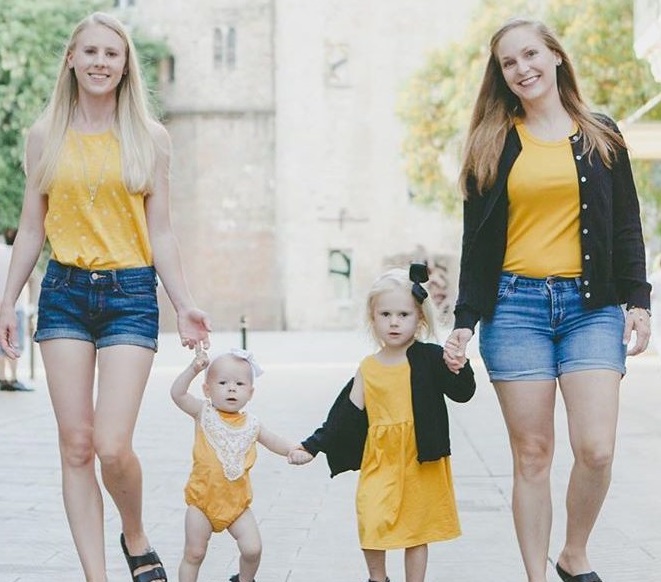
The handful of people I told have accepted my moms and
my family. They often found that part of my life to be
strange and unique. One of my sister’s friends even went
so far as to say that she wished she did not have a dad
and that she too had two moms. Now, that does not mean
all of these people support the idea of LGBTQ marriage.
I had a friend tell me, “Of course I support your family
— I just don’t support LGBTQ in general.” But how could
someone accept my family but not accept the millions of
others just like us? Between 2 to 3.7 million children
have an LGBTQ parent, 200,000 of which are raised by a
same-sex couple, according to a 2015 journal article
that appeared in “The Future of Children,” a journal
published by Princeton University.
Pete Buttigieg Discusses Life with
Husband Chasten and Twins
My Gay Mums Are My Best Friends
Gay Parent Magazine
What is it Like to be a Queer Parent in 2024?
Kids with Lesbian Parents Are Just as
Healthy As Other Kids, Study Finds
Queer Mom Chronicles
Things People Ask Gay Dads
The Ham Family
Famous Queer Dads Living Their Dream
No Differences Between Children of Same-Sex and
Opposite-Sex Parents
Children of Gay Parents Speak for Themselves
Gay Dads Share Personal Stories
Info: LGBTQ Families
Kids of Queer Parents Are Alright,
Sometimes Even Better
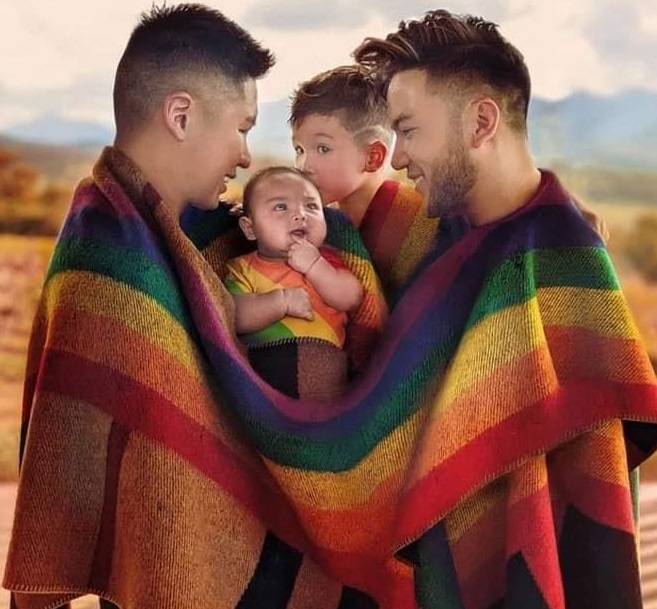

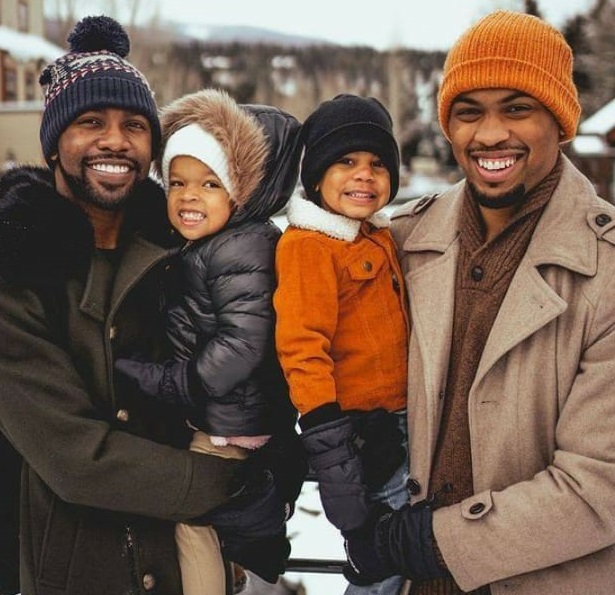
Talking With Grown Kids of Gay
Parents
Science Says: Gay Parents are
Better than Straight Parents
Queer Mom Chronicles
Joys and Challenges of Queer Motherhood
Kids of Queer Parents Are Alright,
Sometimes Even Better
Our Favorite LGBTQ Moms
Vernon and Ricardo: Wonderful Portrait of
Modern Fatherhood
New Report: Gay Dads Make Better Parents
Famous Gay Dads We Love
Two Moms in Motion
Singer Brandi Carlile:
Raising Children as an LGBTQ Mom
Famous Gay Dads and Their Kids
Kids Can Thrive with Gay Parents
Growing up with two moms puts an interesting twist on
the perspective of a young kid. Society emphasizes
heteronormativity, especially through the lack of LGBTQ
representation on platforms like entertainment and
media, but having two role models who break the mold
from birth counterbalances that in a way. I grew up
questioning my sexuality constantly, wondering if I
would end up liking men, like the societal norm, or
women, like my moms. I did not fear that they would not
accept me if I were “different” because they were
different. It was freeing, almost, to be able to
navigate my sexuality that way, and looking back, it was
very rare. I found that I was heterosexual, but that was
much more so by choice after contemplation than as a
default.
My sister and I essentially look like twins and get
called that consistently even though we are three years
apart in age. Nevertheless, the second people find out
we have two moms, they wonder if we are related, which
is hilarious since we look the same. Megan and I are
fully related, born of the same mom and the same
anonymous donor. She and I have grown up together and
grown closer over time.
Megan and I bond over little quirks in our family, such
as what I like to call “getting mommed times two.” Moms
are known for always asking if you did things like doing
chores or your homework to the point of nagging
sometimes. Imagine that amount of “momming” but coming
from two different people. It is only double the amount
of “momming” at most, but sometimes it feels like
exponentially more. That being said, I know it’s because
they care about me, so I am thankful for it, even if I
respond with “Eema already told me that. Four times.”
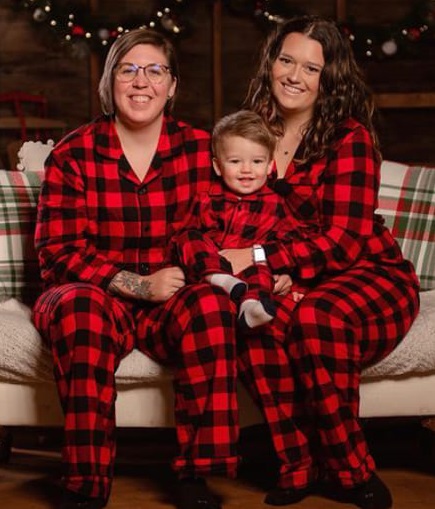
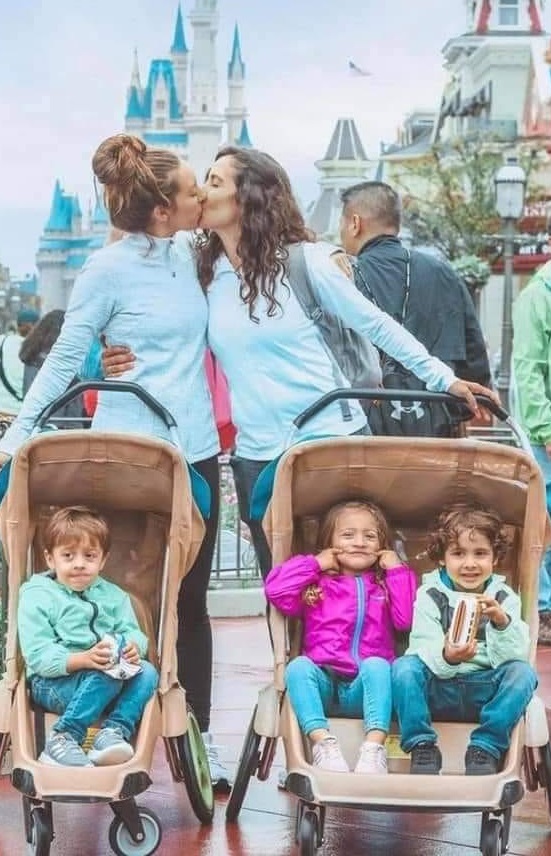
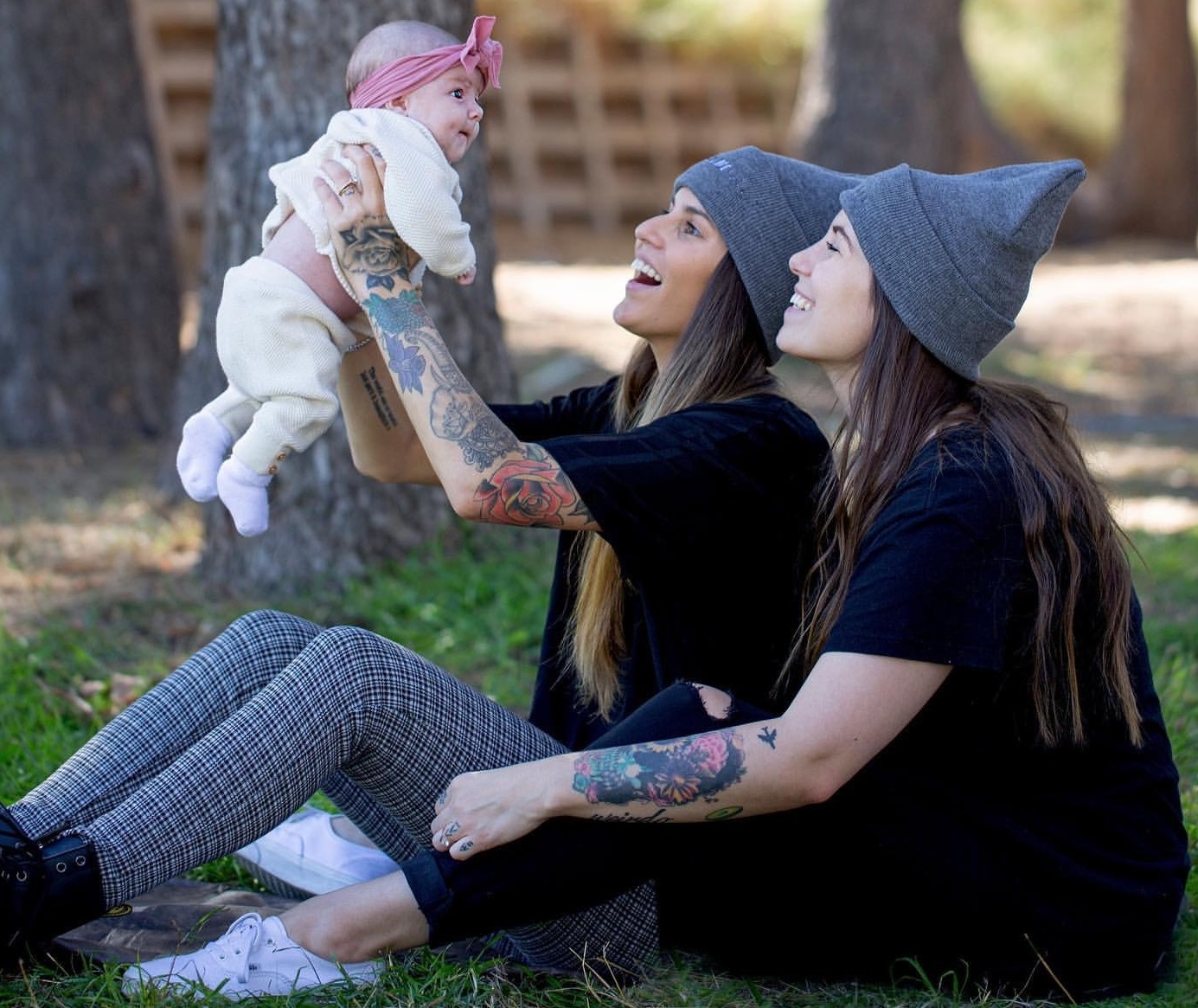
Pride and Family
Cheyenne
Jackson's Kids Came Out as
Straight
Pete Buttigieg Discusses Life with
Husband Chasten and Twins
Celebrate Father’s Day With These Famous Gay Dads
What is it Like to be a Queer Parent in 2024?
New Book:
Ultimate Guide for Gay Dads
Famous Queer Dads Living Their Dream
Photos of What Gay Fatherhood Looks Like
My Gay Mums Are My Best Friends
Advocate: What I've Learned From Being a Gay Dad
In My Shoes: Stories of Youth with LGBTQ
Parents
PBS Video: Olivia Has Two Moms
Straight Daughter Responds to Questions About Her
Lesbian Moms
Celebrities Raised by Gay Parents
My parents did not go to Pride until last summer.
Honestly, I think they spent so much time trying to
normalize that side of themselves that they isolated
themselves for the most part from the LGBTQ community.
It took me and Megan pushing them for them to finally
go. I think they liked it pretty well. I believe they
were still stuck in the mindset that many people do not
support the LGBTQ community, but when they went to
Pride, their perception shaped into something new and
more colorful. So many people were there to support the
idea that a family like mine can exist. That is
something beautiful. My parents told me they saw that
widespread and diverse support, and it made them feel
connected the LGBTQ community and the overall movement
more. I am glad they had that experience, even if it
took so long for them to get there.
My parents’ story is pretty normal. Yet it is, at the
same time, inspiring. I hope young LGBTQ people read
this story and realize it is possible to be successful,
develop a household and start a family no matter your
sexuality. My parents are strong, powerful women who
decided to live truthfully to themselves, even if it was
out of the ordinary and scary. Do not think that you
don’t have the same rights. There are obstacles in every
journey — my moms have dealt with plenty. But they did
not let those roadblocks stop them. They showed the
people around them that a gay household can be normal
and everlasting. And that, I think, is amazing.
[Source: Nicole Christensen, October 2019]
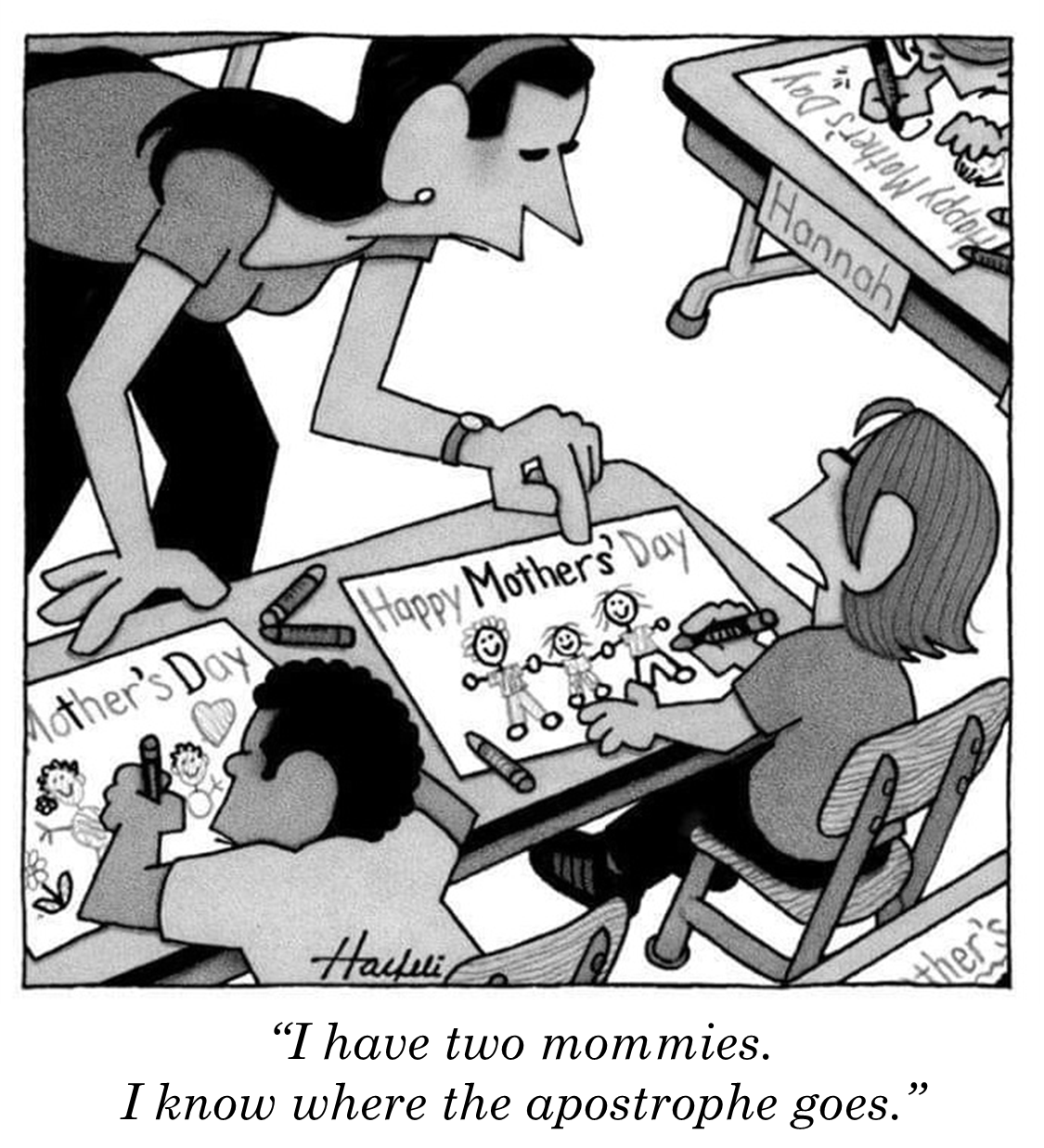
Growing up With Two Moms
Having two Dads: What It's really Like
Gender Roles and Growing Up With Two Moms
Two Dads, Four Kids
Our Favorite LGBTQ Moms
My Gay Mums Are My Best Friends
Having Two Mothers: What People Need to Understand
Famous Queer Dads Living Their Dream
Queer Mom Chronicles
This Is What Gay Fatherhood Looks Like
Two Moms in
Motion
Two Moms or Two Dads
Can LGBTQ parents raise kids? Sometimes people are
concerned that children being raised by a gay parent
will need extra emotional support or face unique social
stressors. Current research shows that children with gay
and lesbian parents do not differ from children with
heterosexual parents in their emotional development or
in their relationships with peers and adults. It is
important for parents to understand that it is the
quality of the parent/child relationship and not the
parent’s sexual orientation that has an effect on a
child’s development.
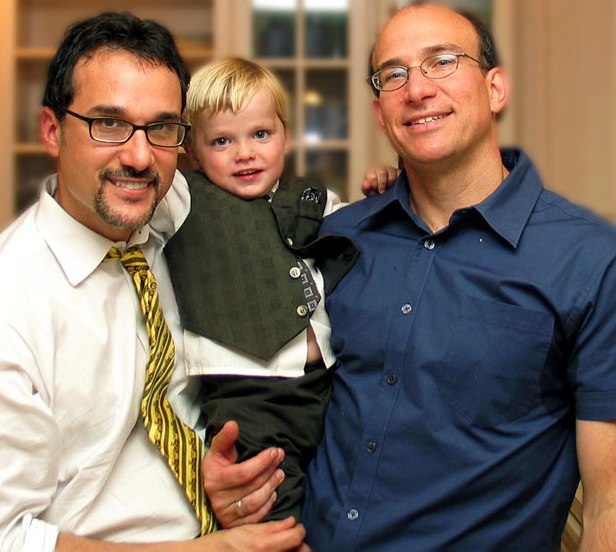

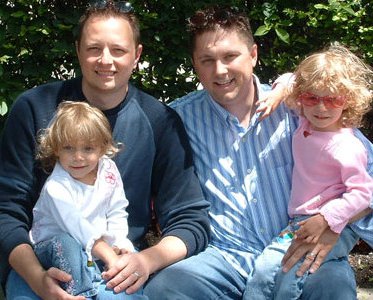
Pete Buttigieg Discusses Life with
Husband Chasten and Twins
Stories of Gay Dads and
Their Foster Families
Straight Kid Talks About
Her Gay Parents
Vernon and Ricardo: Wonderful Portrait of
Modern Fatherhood
Huff Post: Teased for
Having Two Mommies
This Is What Gay Fatherhood Looks Like
Kids with Lesbian Parents Are Just as
Healthy As Other Kids, Study Finds
Gay Parents: Gabriel and Dylan's Story
Famous Queer Dads Living Their Dream
Short Film: Normal
Research has shown that in contrast to common beliefs,
children of lesbian, gay, or transgender parents:
--Are not more likely to be gay than children with
heterosexual parents.
--Are not more likely to be sexually abused.
--Do not show differences in whether they think of
themselves as male or female (gender identity).
--Do not show differences in their male and female
behaviors (gender role behavior).
Although research shows that children with gay and
lesbian parents are as well adjusted as children with
heterosexual parents, they can face some additional
challenges. Some LGBTQ families face discrimination in
their communities and children may be teased or bullied
by peers.
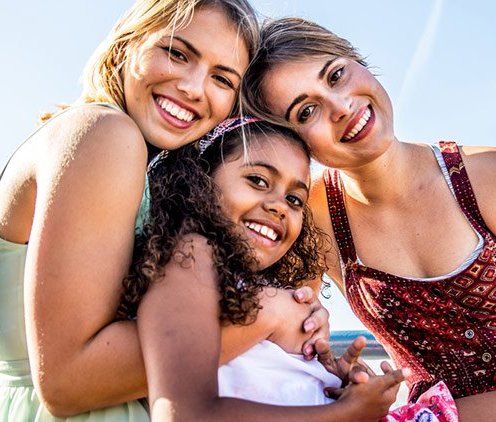

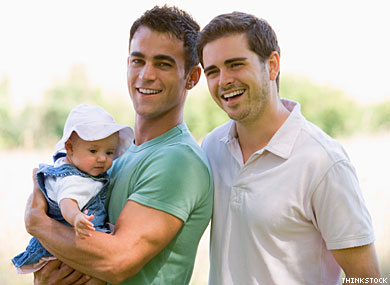
Talking With Grown Kids of Gay
Parents
Science Says: Gay Parents are
Better than Straight Parents
Celebrities Raised by Gay Parents
My Gay Mums Are My Best Friends
Unlikely Hero: Father
Comes Out to Kids on Father's Day
Info: LGBTQ Families
Parents can help their children cope with these
pressures in the following ways:
--Prepare your child to handle questions and comments
about their background or family.
--Allow for open communication and discussions that are
appropriate to your child’s age and level of maturity.
--Help your child come up with and practice appropriate
responses to teasing or mean remarks.
--Use books, Web sites and movies that show children in
LGBTQ families.
--Consider having a support network for your child (For
example, having your child meet other children with gay
parents.)
--Consider
living in a community where diversity is more accepted.

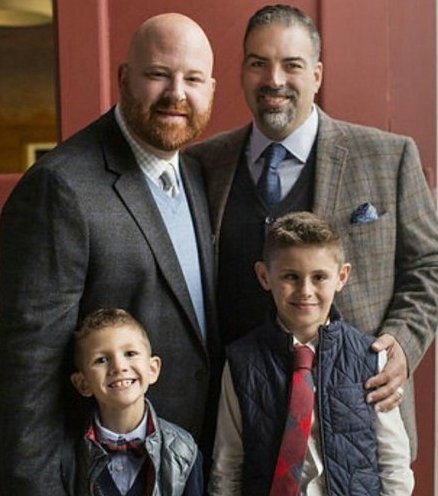
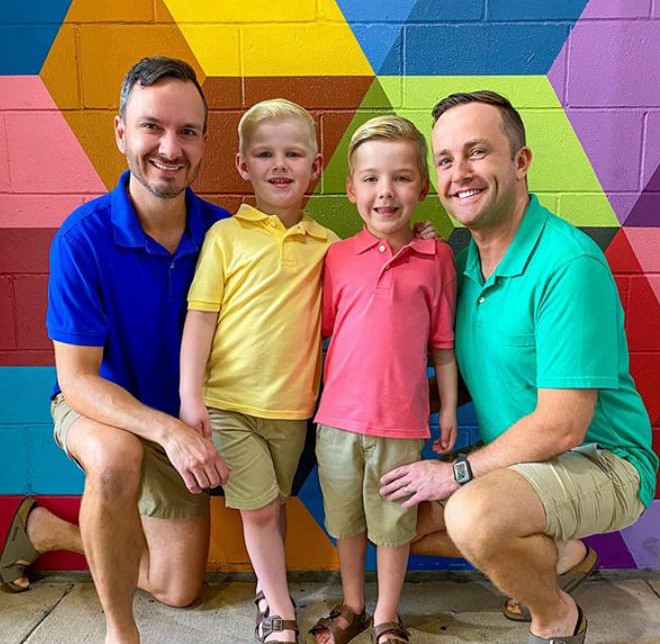
Jared Polis: Being a Dad, Husband, and
America's first Out Gay Governor
New Book:
Ultimate Guide for Gay Dads
This Is What Gay Fatherhood Looks Like
Famous Queer Dads Living Their Dream
Tips for Parenting as a Queer Couple From
Someone Who’s Been There
Ron and Greg: Story of Two Gay Dads
Tess and Nikina: Story of Two Lesbian Moms
LGBTQ Parents
Raising Straight Kids
Is there a
negative impact of growing up in a home with gay
parents? Luckily, this is an area of psychology in which
the research is truly conclusive: children have just as
much chance to thrive with gay parents as with straight
parents. A new study published this fall in the journal
Developmental Psychology reaffirms this conclusion, and
should serve as reassuring evidence that validates the
experience of tens of thousands of gay and lesbian
parents raising children in America.
The study followed more than 100 families, all of whom
adopted children in infancy from the same set of private
agencies in the US. All of the families were two-parent
families at the time of the adoption. Approximately half
of the families were headed by opposite-sex parents and
half were headed by same-sex parents (including both
lesbian couples and gay male couples). The groups of
straight and gay parents were well-matched to one
another on demographic variables including parental age,
race, employment status, and highest level of education
obtained. All of the couples adopted infants who were
not biologically related to either member of the couple.
Pride and Family
Gays With Kids
Family Equality
Council
Brief History of LGBTQ
Parenting
Famous Queer Dads Living Their Dream
Kids of Queer Parents Are Alright,
Sometimes Even Better
Gay Parents: Anthony and Bryon's Story
Two Moms in
Motion
AAMFT: Same-Sex Parents
and Their Children
Photos of What Gay Fatherhood Looks Like
Tips for Parenting as a Queer Couple From
Someone Who’s Been There
Things People Ask Gay Dads
The Ham Family
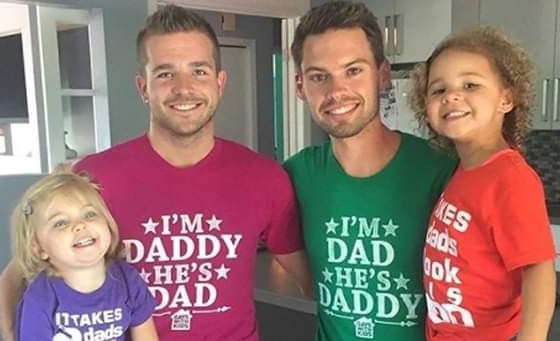
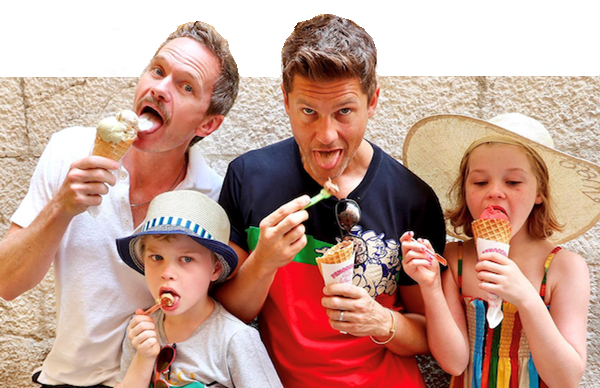
Family Equality:
Brief History of LGBTQ Parenting
Custody and Adoption
We first
hear of out LGBTQ parents around the time of World War
II, mostly in the context of cases that denied them
child custody after divorce from different-sex,
cisgender spouses. Starting in the 1970s, however, a few
state courts upheld custody rights for transgender, gay,
and lesbian parents, though some still required that
they not live with a partner or engage in “homosexual
activities.”
In the 1960s and 70s, as the nascent LGBTQ rights
movement buoyed the community, out LGBTQ people also
began starting families. Bill Jones, a gay man, in 1968
became the first single father to adopt a child in
California and one of the first nationally—although, as
he told NPR in 2015, he was obliquely advised by a
social worker not to mention that he was gay. A decade
later, New York became the first state not to reject
adoption applicants solely because of “homosexuality.” A
gay couple in California in 1979 became the first in the
country to jointly adopt a child.
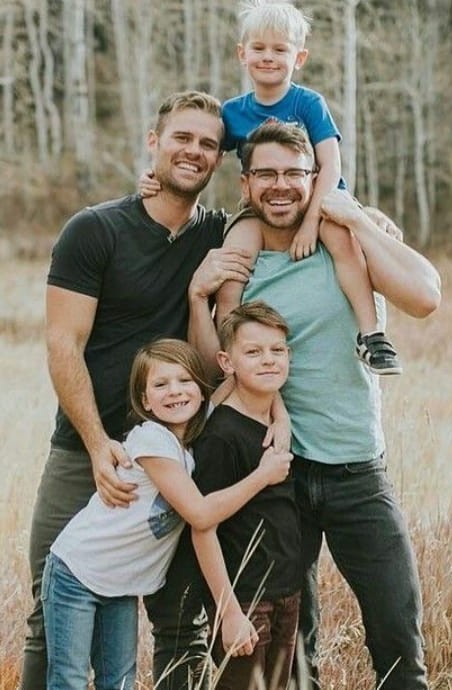
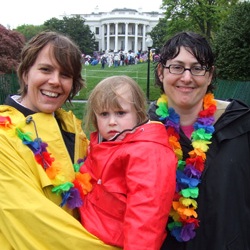
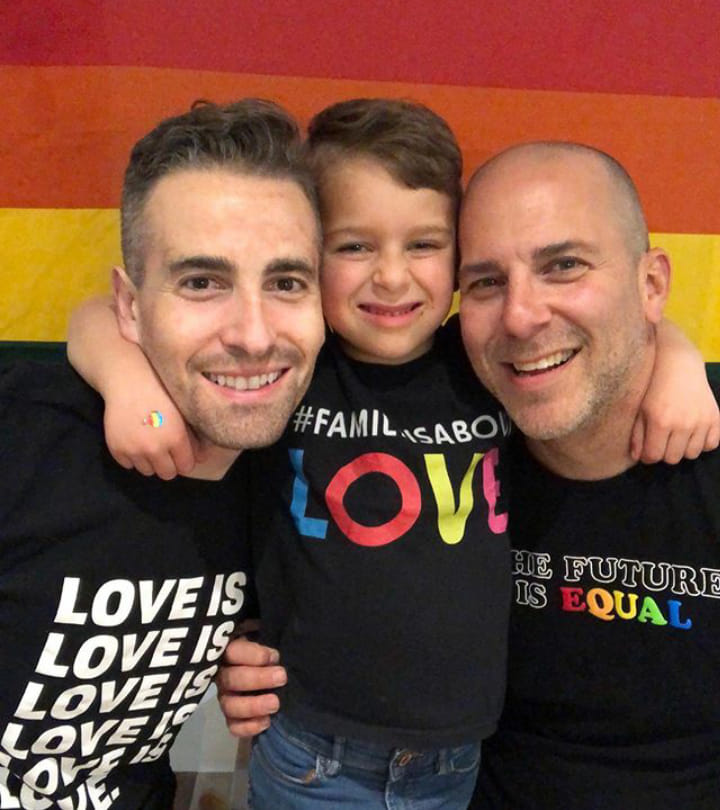
Joys and Challenges of Queer Motherhood
Vernon and Ricardo: Wonderful Portrait of
Modern Fatherhood
Rainbow Babies
Steve and Rob: Two Dads Adopt Six Siblings
Children of Queer Parents Don't Have it Easy
Info: LGBTQ Adoption
How Gay Dads Respond to "The Mommy"
Question
Queer Mom Chronicles
Greg and Paul: Two Dads Foster Adopt
Lesbian Moms: How We Met
Famous Queer Dads Living Their Dream
Me and My Gay Parents
Gay Parent Magazine
It wasn’t until 1997, however, that New Jersey became
the first state to allow same-sex couples to adopt
jointly statewide, and not until 2010 did the last
state, Florida, overturn a ban on adoption by gay men
and lesbians. Several other states continued to ban
unmarried couples, though, effectively stopping same-sex
couples from adopting until marriage equality became
federal law in 2015.
In the 1970s, too, female couples and single women
increasingly began to start their families together
through pregnancy. In 1982, the Sperm Bank of California
opened as the first fertility clinic in the country to
serve this market (although many queer people had been
doing home inseminations for years before).
In 1999, Matt Rice became possibly the first transgender
man to give birth in the US, although it is hard to tell
how the few people in the 19th century who gave birth
but lived as men would have identified. (They are our
queer parental forebears, regardless.) The same year, a
British gay couple had children through surrogacy in
California, where a court for the first time allowed two
gay dads to be on their children’s birth certificate.
In 1985, some same-sex couples first obtained what
became known as “second-parent adoptions” to secure a
child’s legal connection to a nonbiological parent. A
decade later, the Wisconsin Supreme Court was the first
state high court to say a nonbiological mother may seek
visitation after separation.
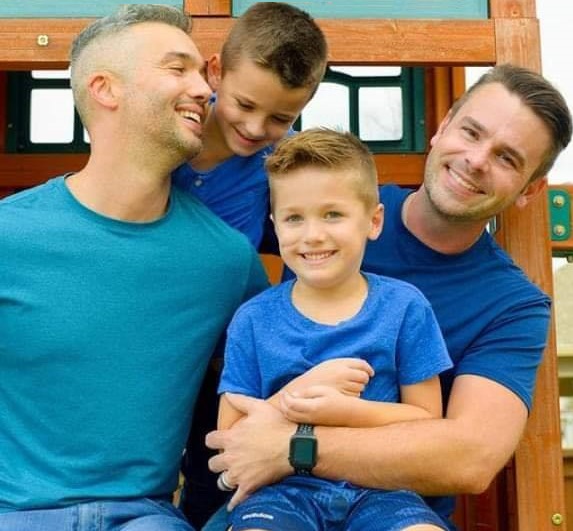
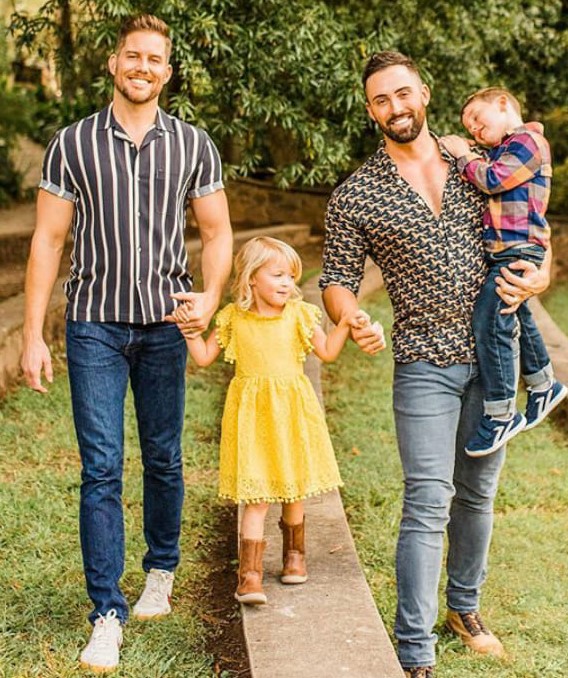
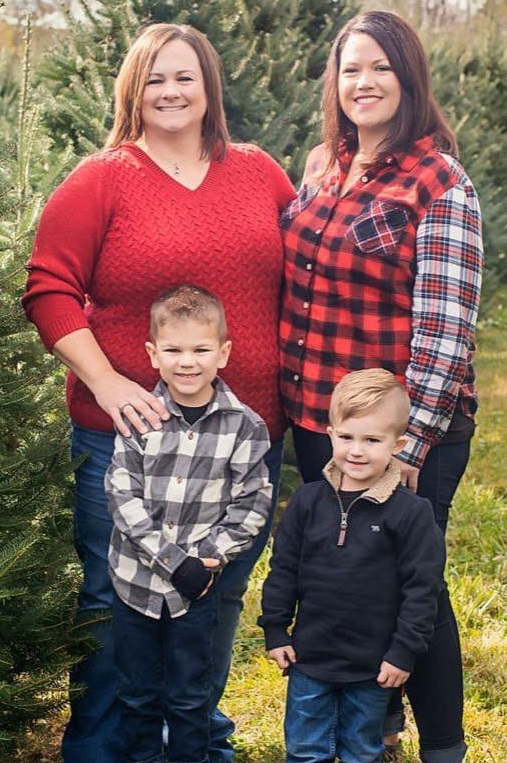
Kids Can Thrive with Gay Parents
Pete Buttigieg Discusses Life with
Husband Chasten and Twins
Difficult Job: Raising Two
Black Boys as a Lesbian Couple
Tips for Parenting as a Queer Couple From
Someone Who’s Been There
New Report: Gay Dads Make Better Parents
Singer Brandi Carlile:
Raising Children as an LGBTQ Mom
Kristi and Theresa: Lesbian Parents
AAMFT: Same-Sex Parents
and Their Children
Dads Celebrate Daughter’s First Birthday After Difficult
Path To Parenthood
Gays With Kids: Gay Surrogacy
Advocate: What I've Learned From Being a Gay Dad
Straight Daughter Responds to Questions About Her
Lesbian Moms
Children Raised by Same Sex Parents at No Disadvantage
Strength in Community
LGBTQ
parents have long come together to support each other,
as well as to contribute to the broader LGBTQ rights
movement. In 1956, the pioneering San Francisco lesbian
organization Daughters of Bilitis held the first known
discussion groups on lesbian motherhood. The first
lesbian mothers’ activist group, the Lesbian Mothers
Union, formed in the same area 15 years later.
In 1974, several lesbian mothers and friends in Seattle
formed the Lesbian Mothers National Defense Fund to help
those in custody disputes. Similar groups for lesbian
mothers and gay fathers formed in other cities. In 1977,
lawyers Donna Hitchens and Roberta Achtenberg in San
Francisco began the Lesbian Rights Project, which helped
both lesbian moms and gay dads. It evolved into the
National Center for Lesbian Rights, still helping LGBTQ
parents and others across the spectrum today.
Also launched in the same era (1979) was the Gay Fathers
Coalition, which ultimately became Family Equality
Council, the national organization for LGBTQ parents.
Out of this, too, came a program by and for children of
LGBTQ parents, which in 1999 spun off to become COLAGE.
By March 1990, lesbian and gay parents had become
visible enough for Newsweek to coin a term, reporting
that “a new generation of gay parents has produced the
first-ever ‘gayby boom.’”


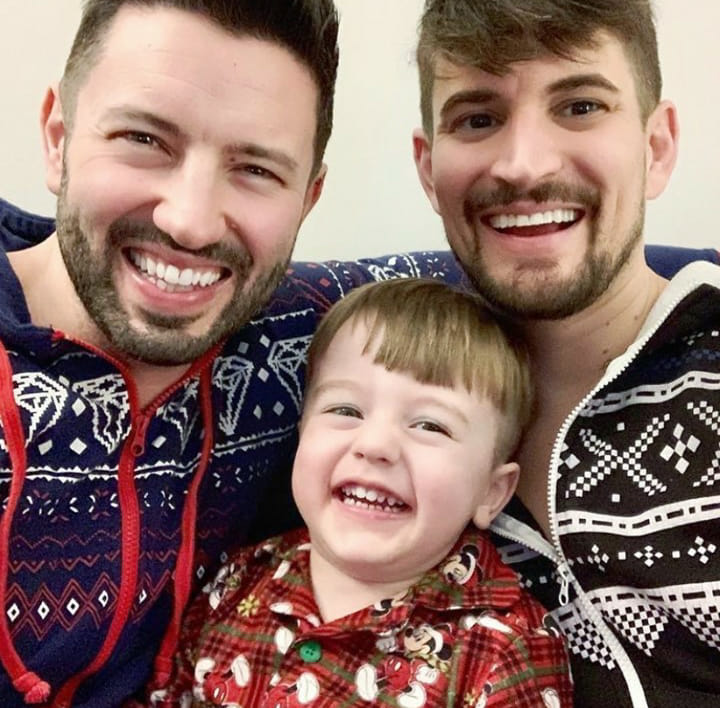
Talking With Grown Kids of Gay
Parents
Science Says: Gay Parents are
Better than Straight Parents
Queer Mom Chronicles
Joys and Challenges of Queer Motherhood
Kids of Queer Parents Are Alright,
Sometimes Even Better
Our Favorite LGBTQ Moms
Vernon and Ricardo: Wonderful Portrait of
Modern Fatherhood
New Report: Gay Dads Make Better Parents
Famous Gay Dads We Love
Singer Brandi Carlile:
Raising Children as an LGBTQ Mom
Famous Gay Dads and Their Kids
Kids Can Thrive with Gay Parents
Seeing Ourselves, Teaching Others
Depictions
of LGBTQ parents in media also go back over 40 years.
ABC’s That Certain Summer (1972), about a gay dad who
comes out to his teen son, was the first television
movie to depict a queer parent. Jane Severance’s 1979
When Megan Went Away was the first picture book in the
US to show a same-sex relationship, but it was Lesléa
Newman’s 1989 Heather Has Two Mommies that took off in
popular culture (garnering praise from LGBTQ families
and opprobrium from conservatives), perhaps because
Heather shows a happy, intact two-mom family. Michael
Willhoite’s Daddy’s Roommate (1990) was the first
children’s book with a gay dad. The first with a clearly
transgender character, Marcus Ewert’s 10,000 Dresses,
didn’t come until 2008.


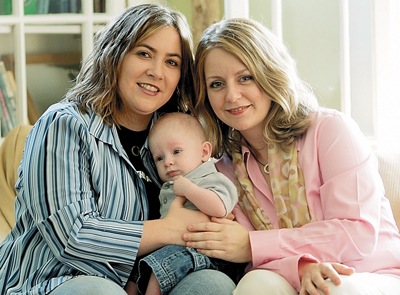
Famous Queer Dads Living Their Dream
Kids of Queer Parents Are Alright,
Sometimes Even Better
Gay Parents: Gabriel and Dylan's Story
My Gay Mums Are My Best Friends
Advocate: Study on Lesbian Moms Shows Kids Are Alright
Gays With Kids: Mitch and Jake’s Adoption Journey
PBS Video: Olivia Has Two Moms
This Is What Gay Fatherhood Looks Like
Marriage Rites and Parental Rights
In recent
decades, marriage equality opponents argued that
children needed both a mother and a father. Marriage
equality, they claimed, would also require that
“homosexuality” be taught in schools. That fear played a
large part in the passage of Proposition 8, California’s
2008 marriage equality ban. LGBTQ advocates flipped this
around, however, through visibility, legitimate social
science research, and court briefs that quoted young
people raised by same-sex couples. The US Supreme Court
then cited children’s well-being as a key argument in
favor of marriage equality in its 2013 and 2015 rulings.
It took another Supreme Court case, however (Pavan v.
Smith), to affirm in June 2017 that marriage equality
means both parents in a married, same-sex couple have
the right to be on their children’s birth certificates
and be legally recognized as parents.
Marriage equality also allowed same-sex couples to adopt
in several states that had not previously allowed
unmarried couples to do so—although several states have
now implemented “religious freedom” laws that allow
child care agencies to discriminate against LGBTQ people
and others in adoption and foster care.
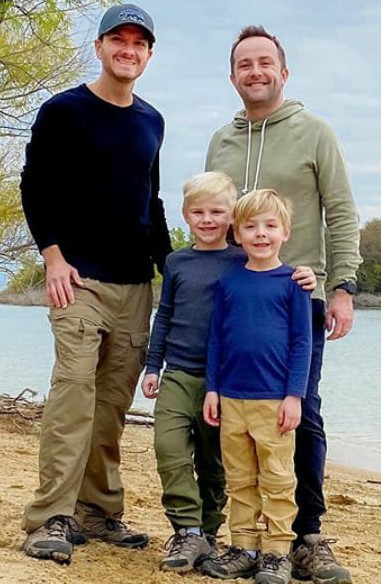
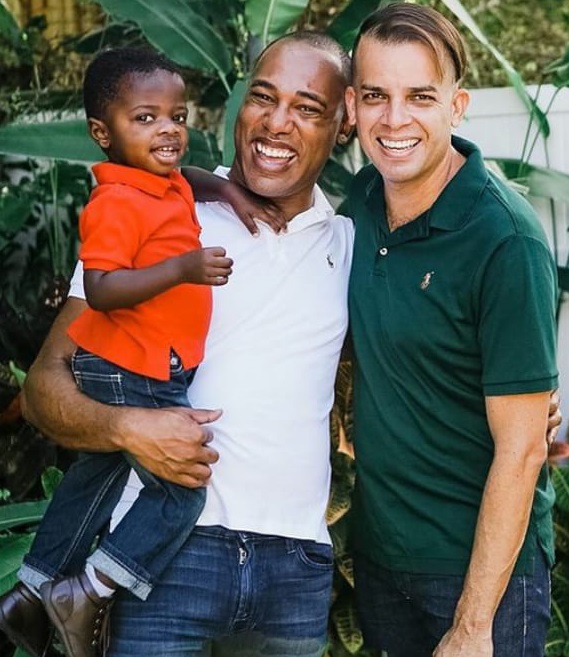

Kids with Lesbian Parents Are Just as
Healthy As Other Kids, Study Finds
Stories of Gay Dads and
Their Foster Families
Anderson Cooper and Andy
Cohen Celebrate Father's Day
Children Raised by Same Sex Parents at No Disadvantage
Gay Parents: Anthony and Bryon's Story
AAMFT: Same-Sex Parents
and Their Children
My Gay Mums Are My Best Friends
Our Favorite LGBTQ Moms
Looking
Back to Look Ahead
There is
much more to be written about the history of LGBTQ
parents, both as a movement and in terms of our
contributions as individuals. This goes doubly for
transgender parents, about whom much less has been
written, and bisexual parents, many of whom were likely
misidentified as gay or lesbian earlier if they were in
same-sex relationships, or overlooked if they were not.
We also need more studies that look at queer parenting
history through the lens of particular racial, ethnic,
and religious backgrounds.
Delving further back, too, and around the world, we find
many parents under the queer umbrella—from the poet
Sappho in 600 BCE to writers Oscar Wilde and Vita
Sackville-West, comedian Jackie “Moms” Mabley, poet Lord
Byron, and jazz musician Billy Tipton. Did their
queerness inform their relationships with their
children? Did being a parent impact how they expressed
their queer identities? And how can we write books about
them for our children that celebrate both? I hope you’ll
ponder these questions as we reflect on our past this
month—and as we look to the future.
[Source: Dana Rudolph, Very Brief History of LGBTQ
Parenting, October 2017]



Famous Queer Dads Living Their Dream
Pete Buttigieg Discusses Life with
Husband Chasten and Twins
Lesbian Couple With Two Kids: Questions for an LGBTQ
Family
Terrell and Jarius: Young Black Gay Couple With Two
Babies
Straight Kid Talks About
Her Gay Parents
Conservatives Outraged: Gay Couple on Cover of Parents
Magazine
Brief History of LGBTQ
Parenting
Gay Parents: Anthony and Bryon's Story
No Differences Between Children of Same-Sex and
Opposite-Sex Parents
How Gay Dads Respond to "The Mommy"
Question
Stories of Gay Dads and
Their Foster Families
Children of Gay Parents Speak for Themselves
Gay Dads Share Personal Stories
Celebrities Raised by Gay Parents
HOME
QUEER CAFE
│ LGBTQ Information Network │ Established 2017 |